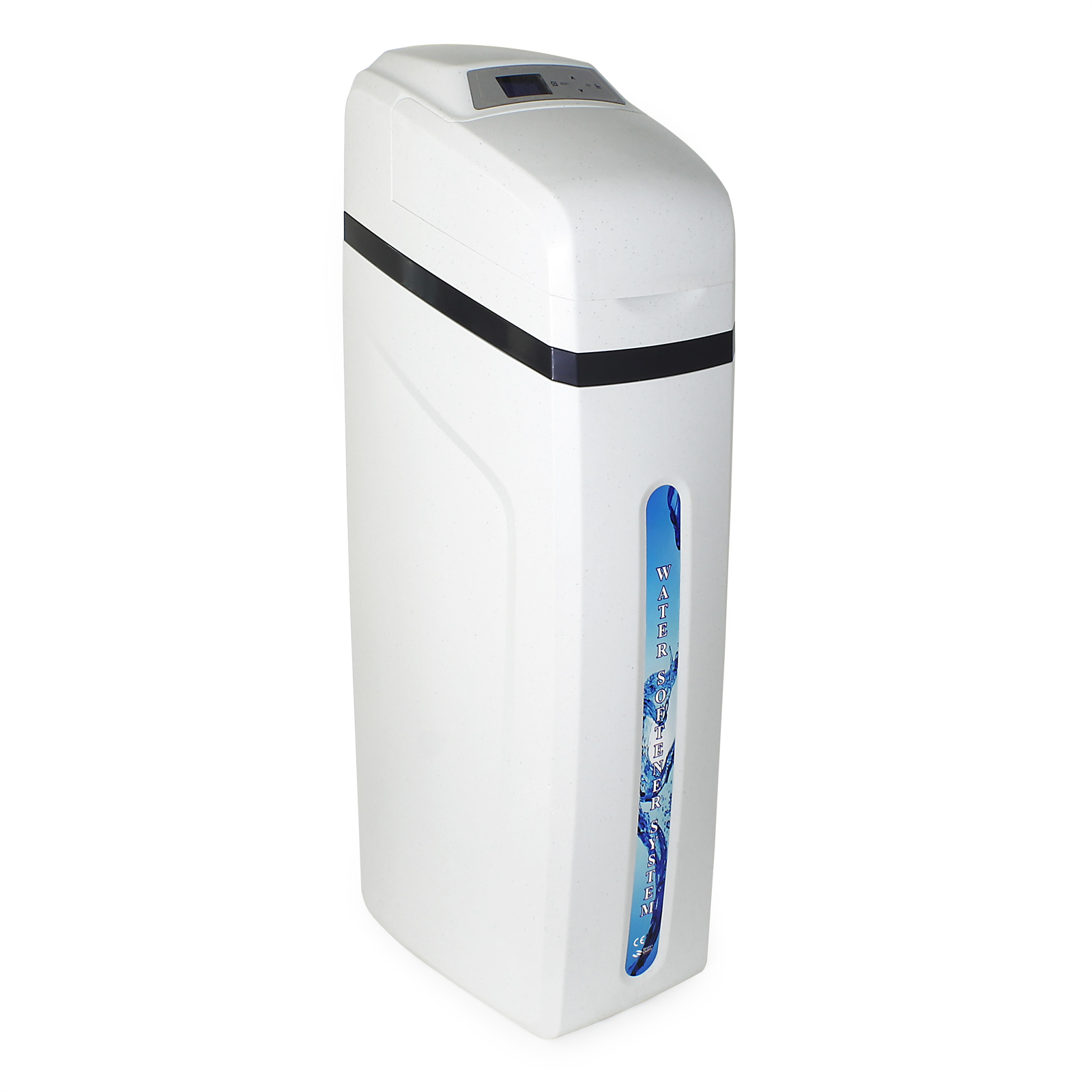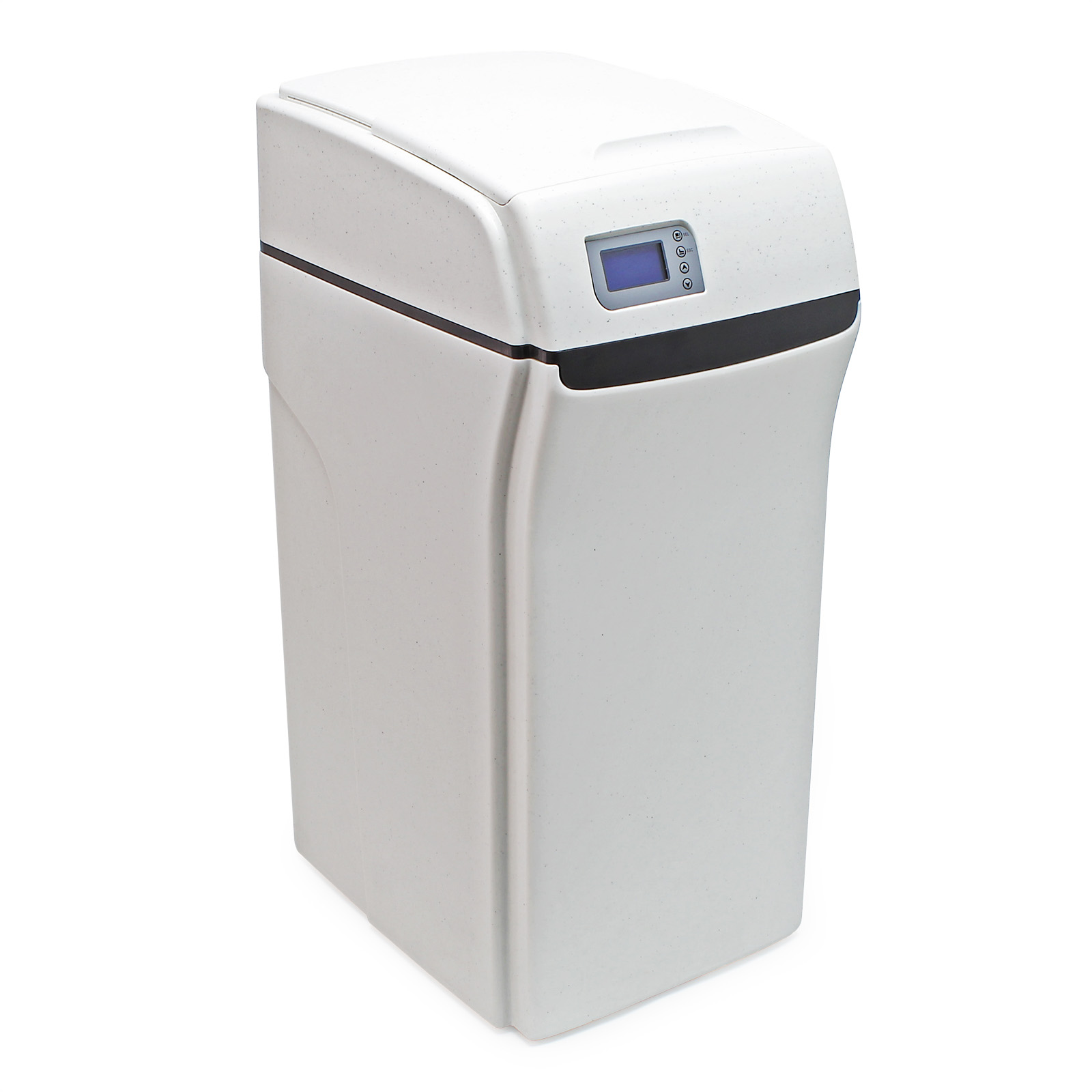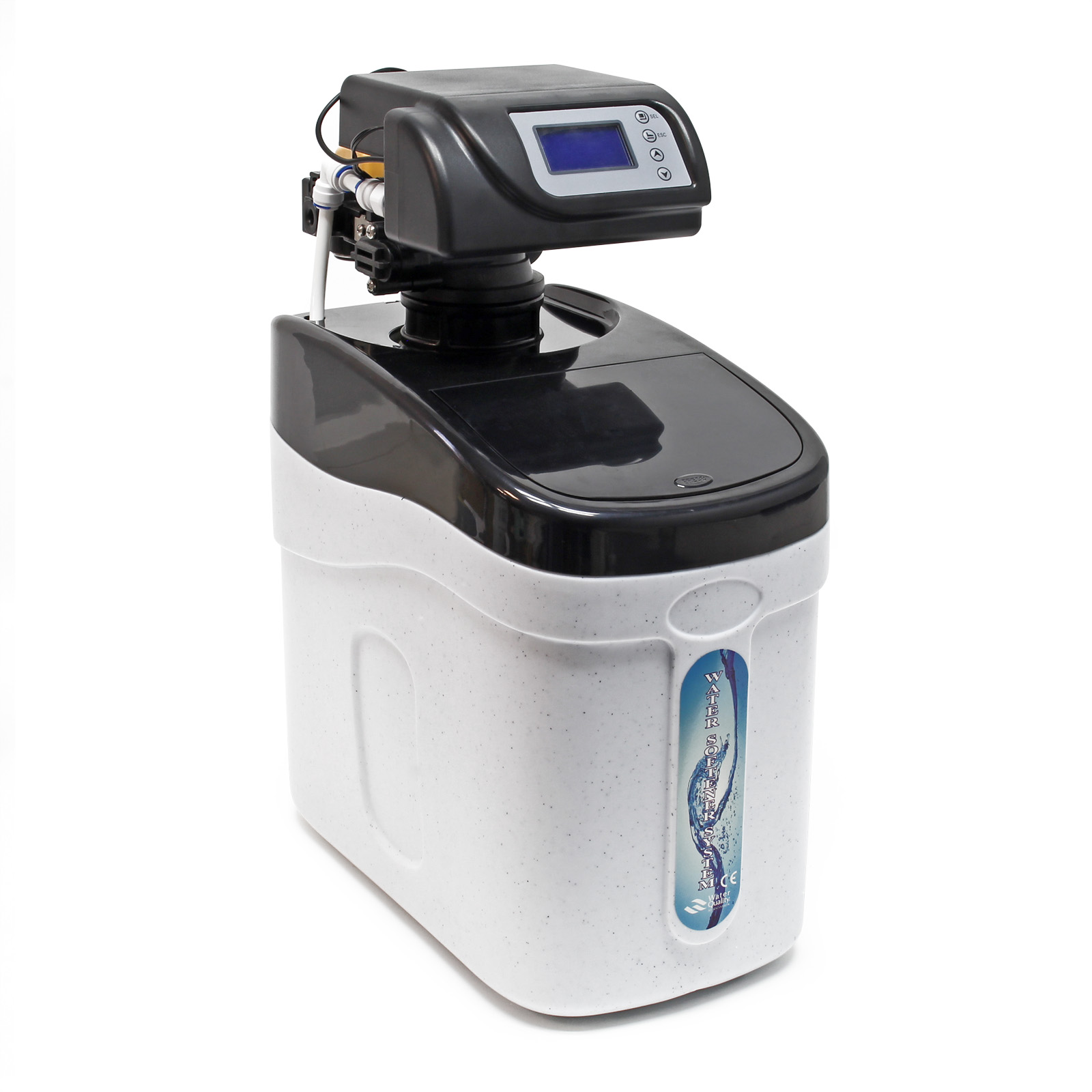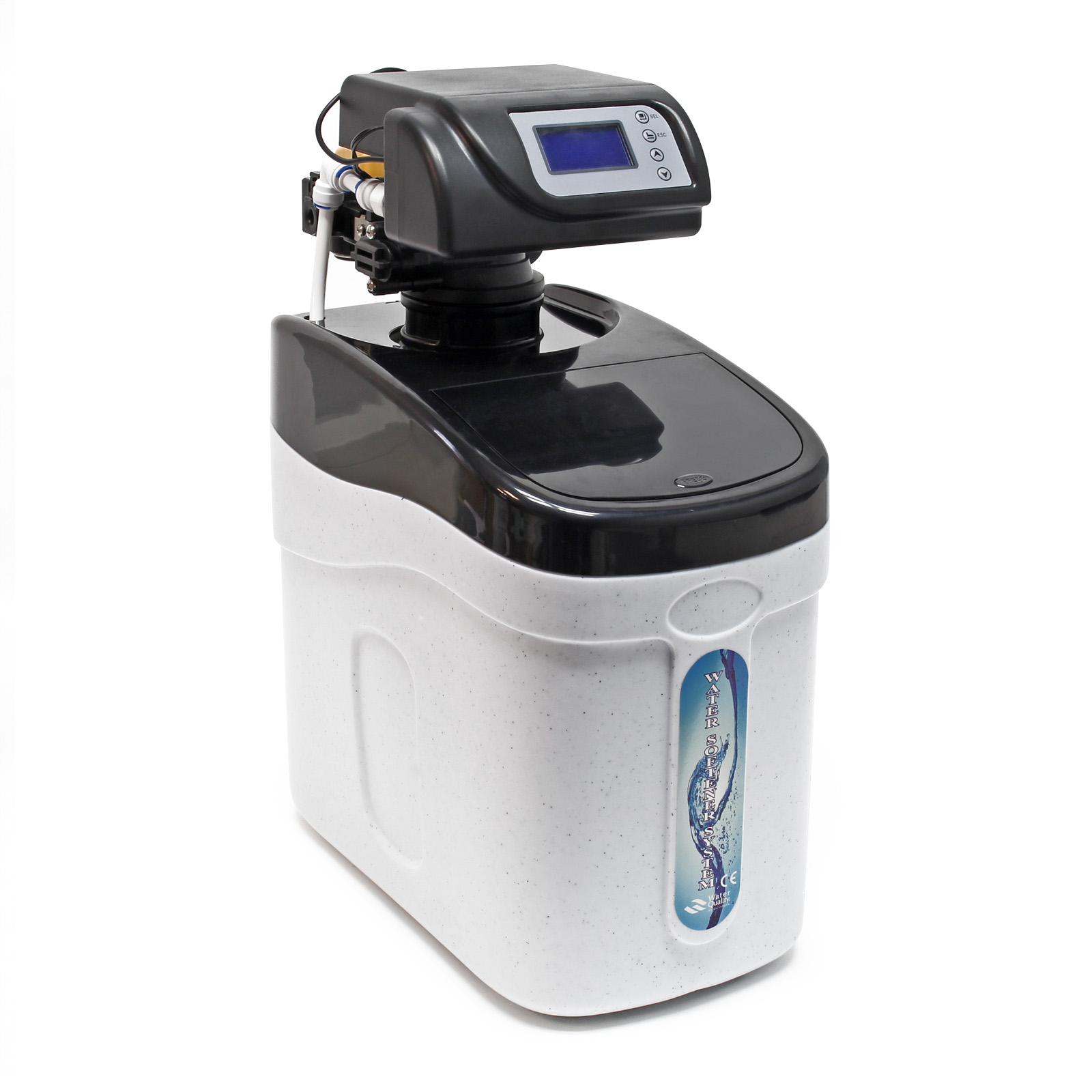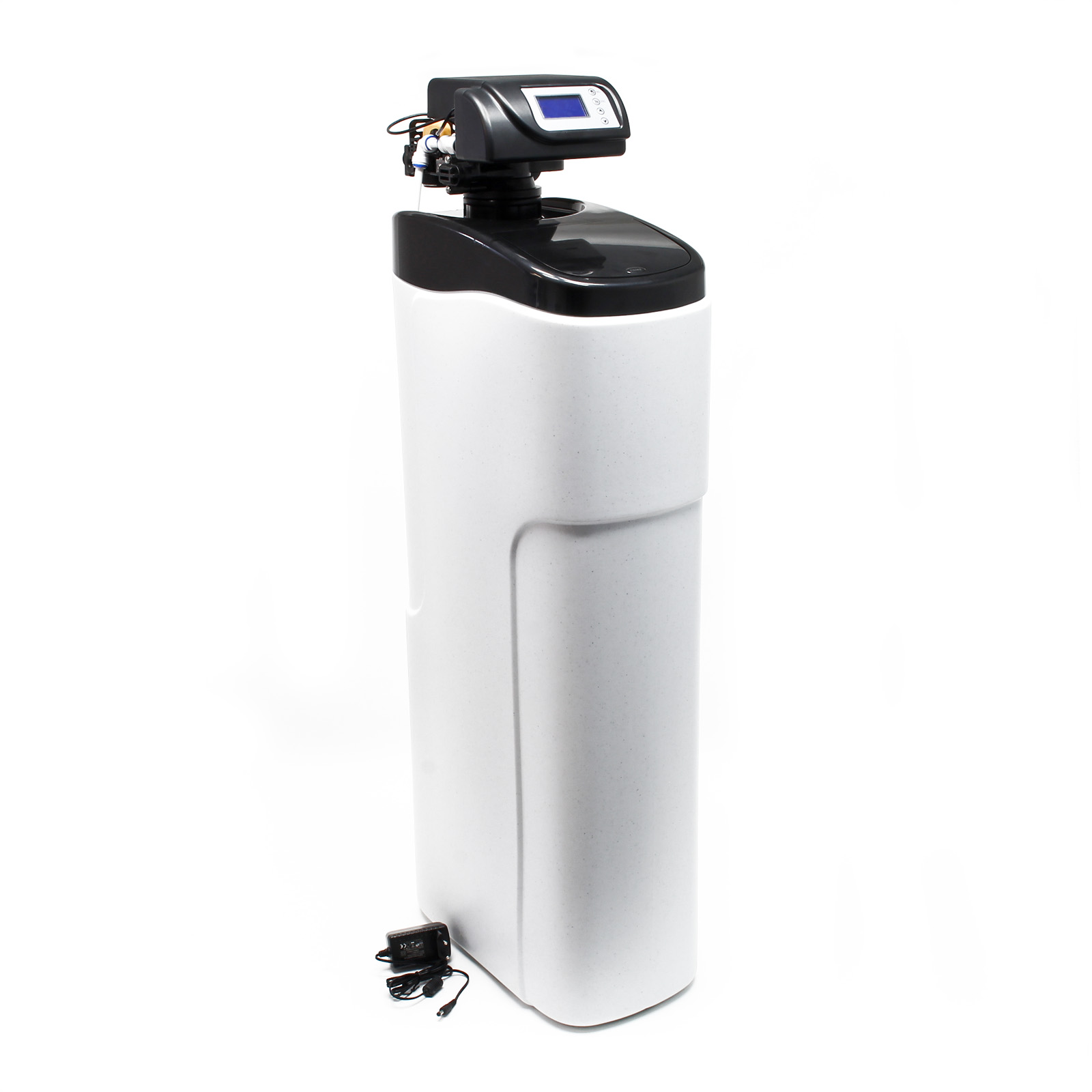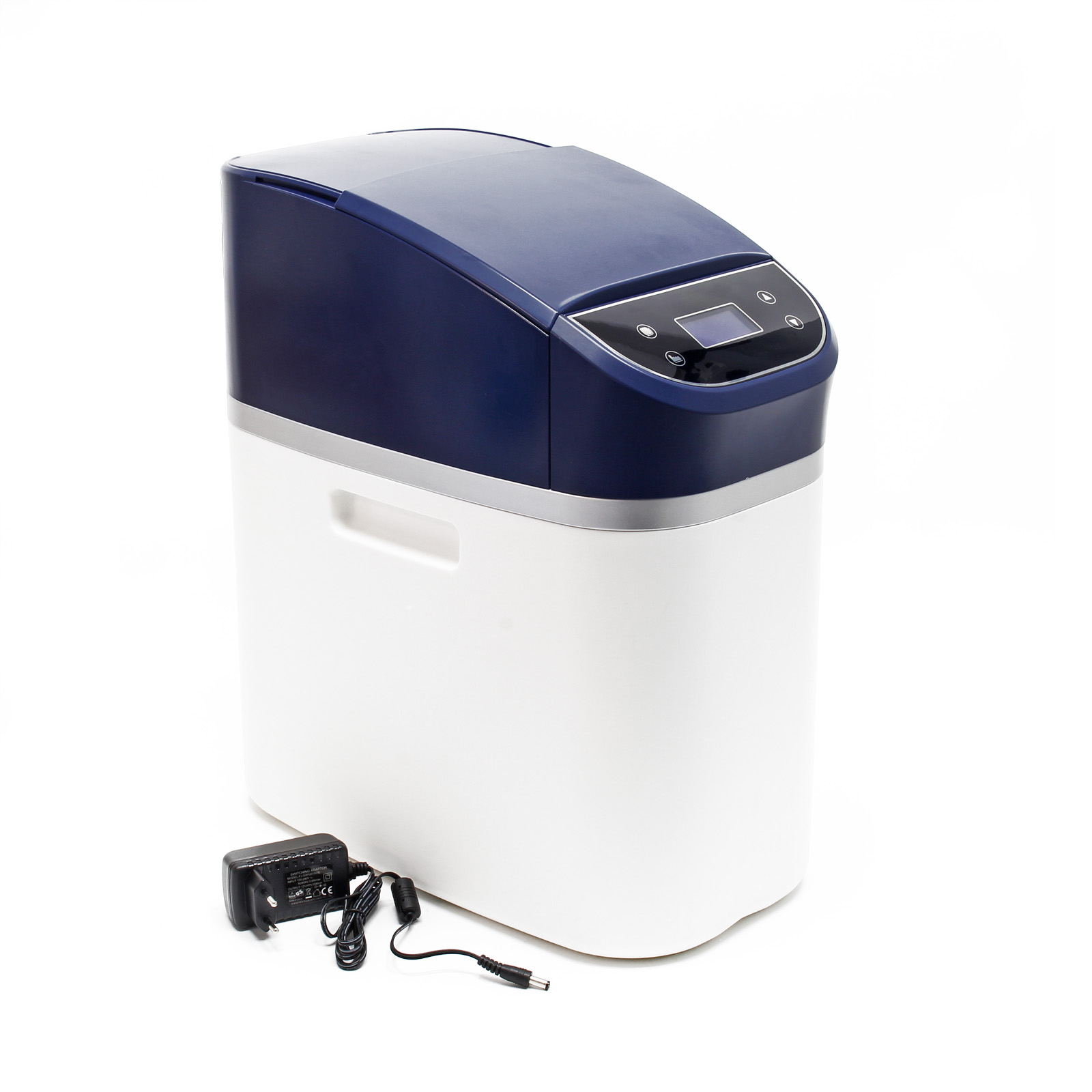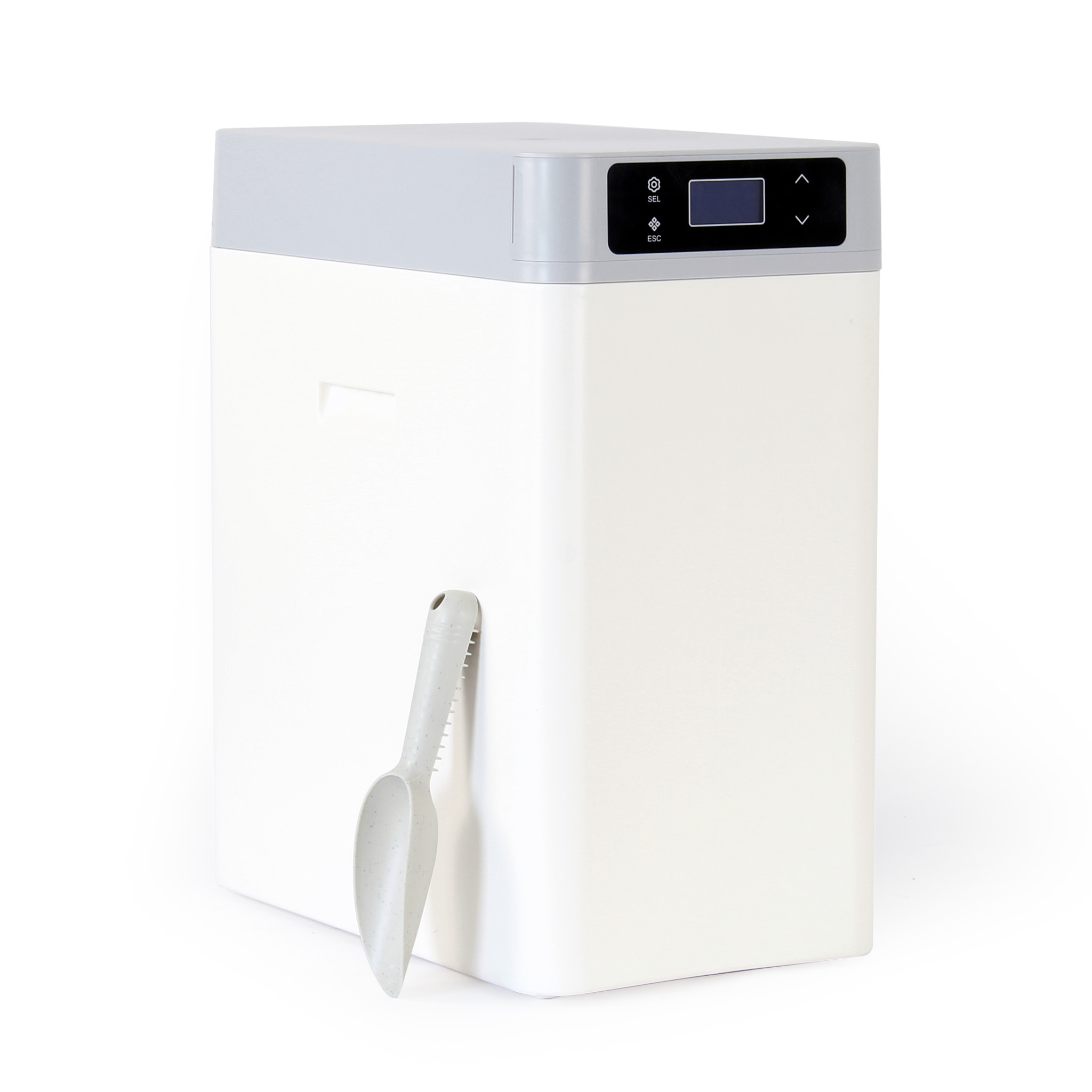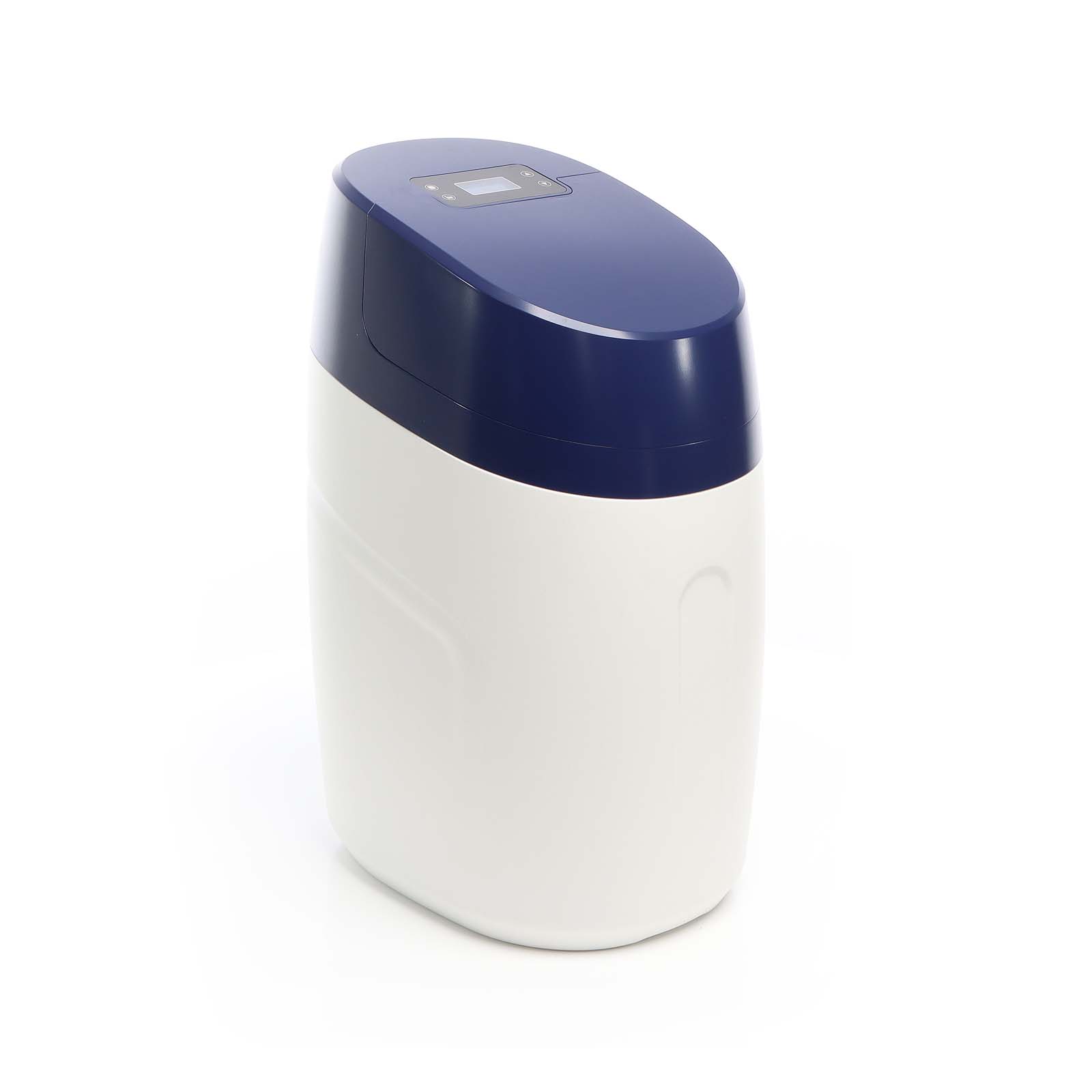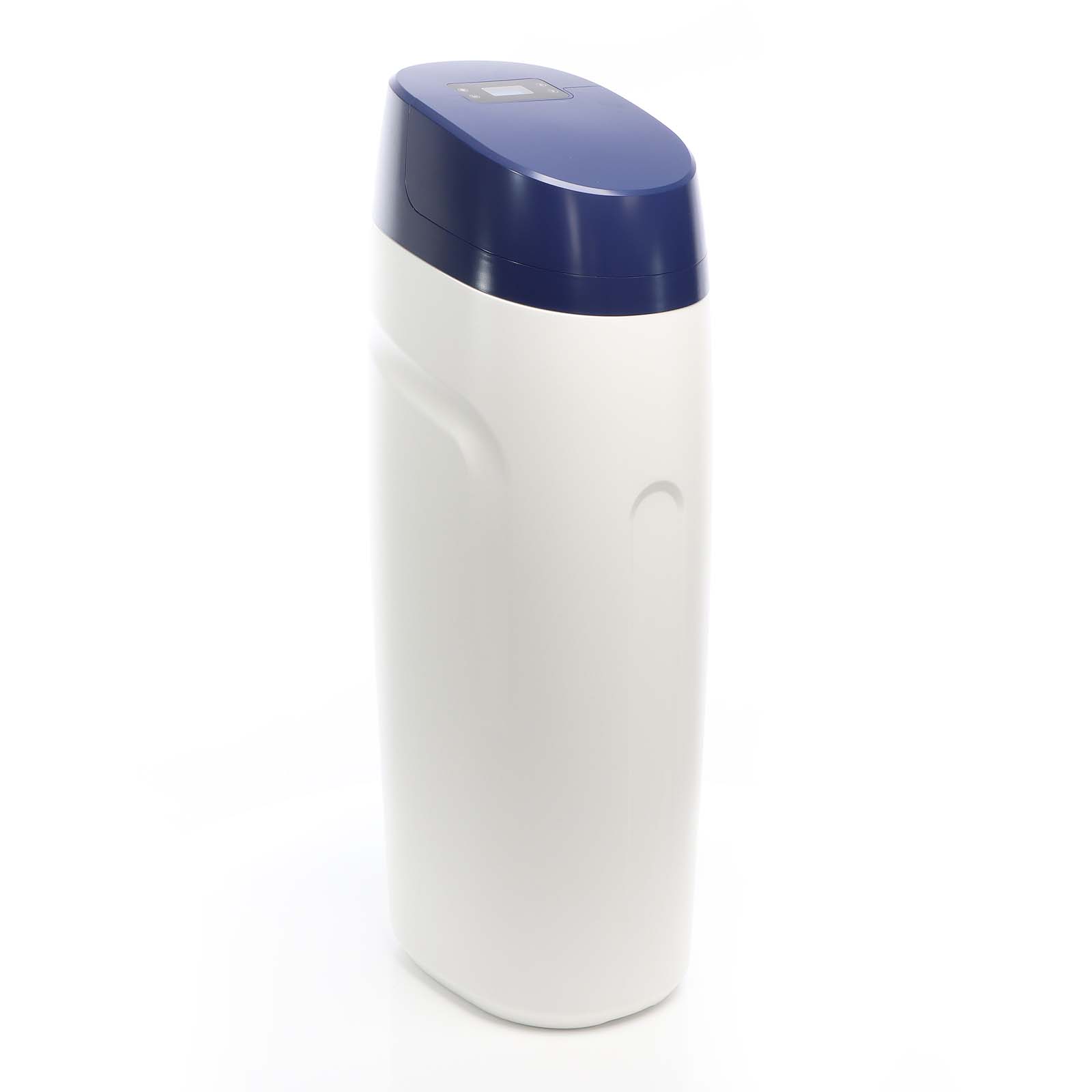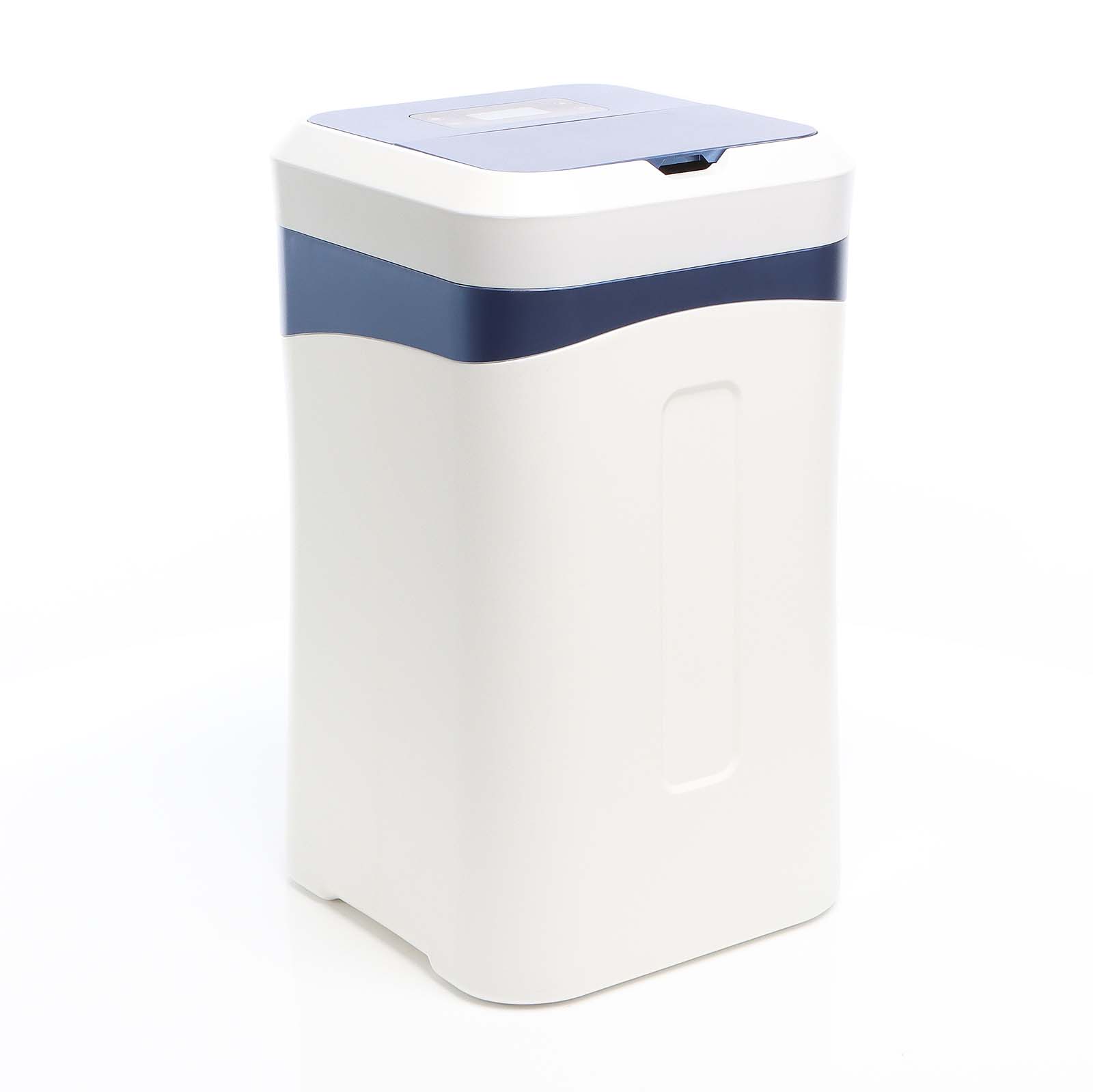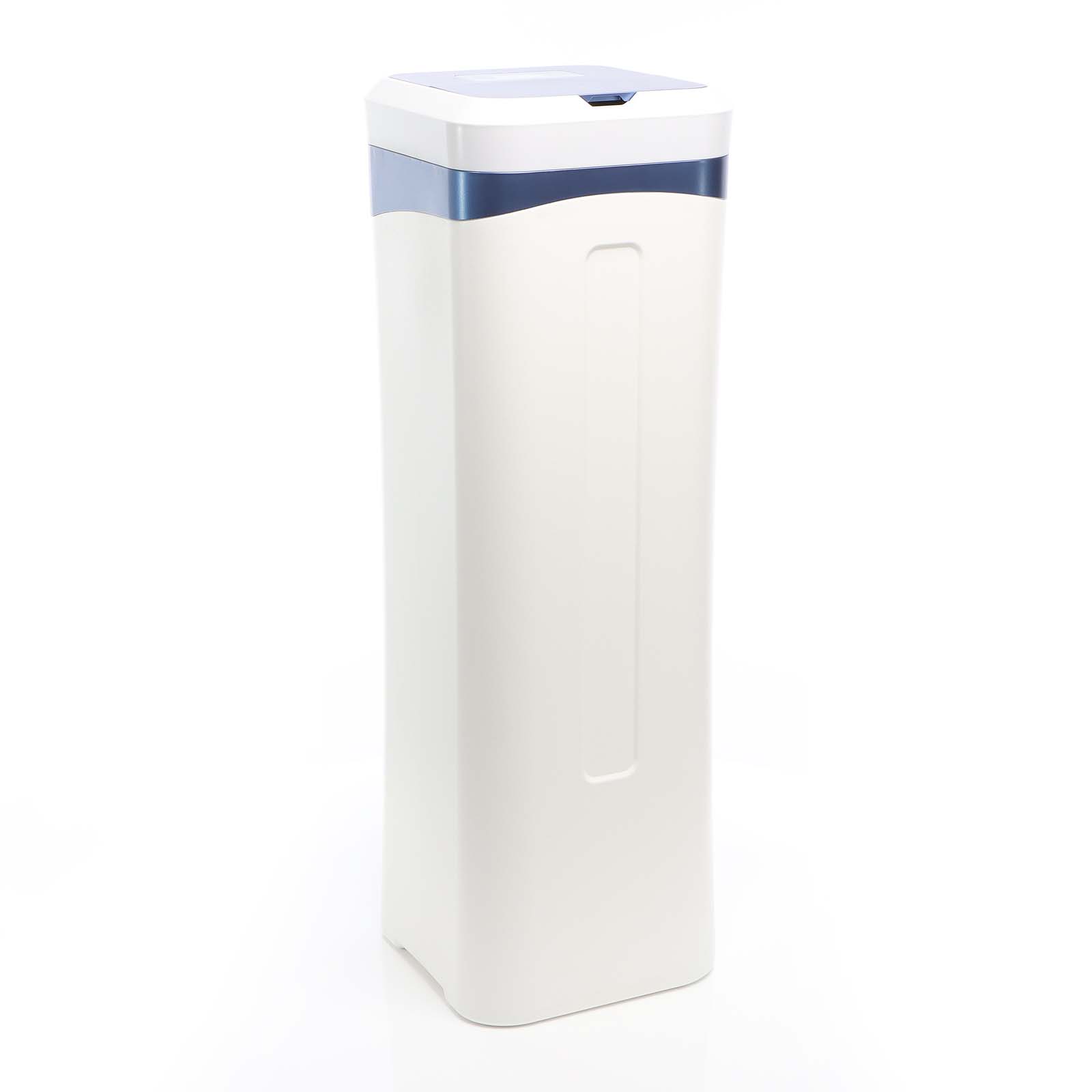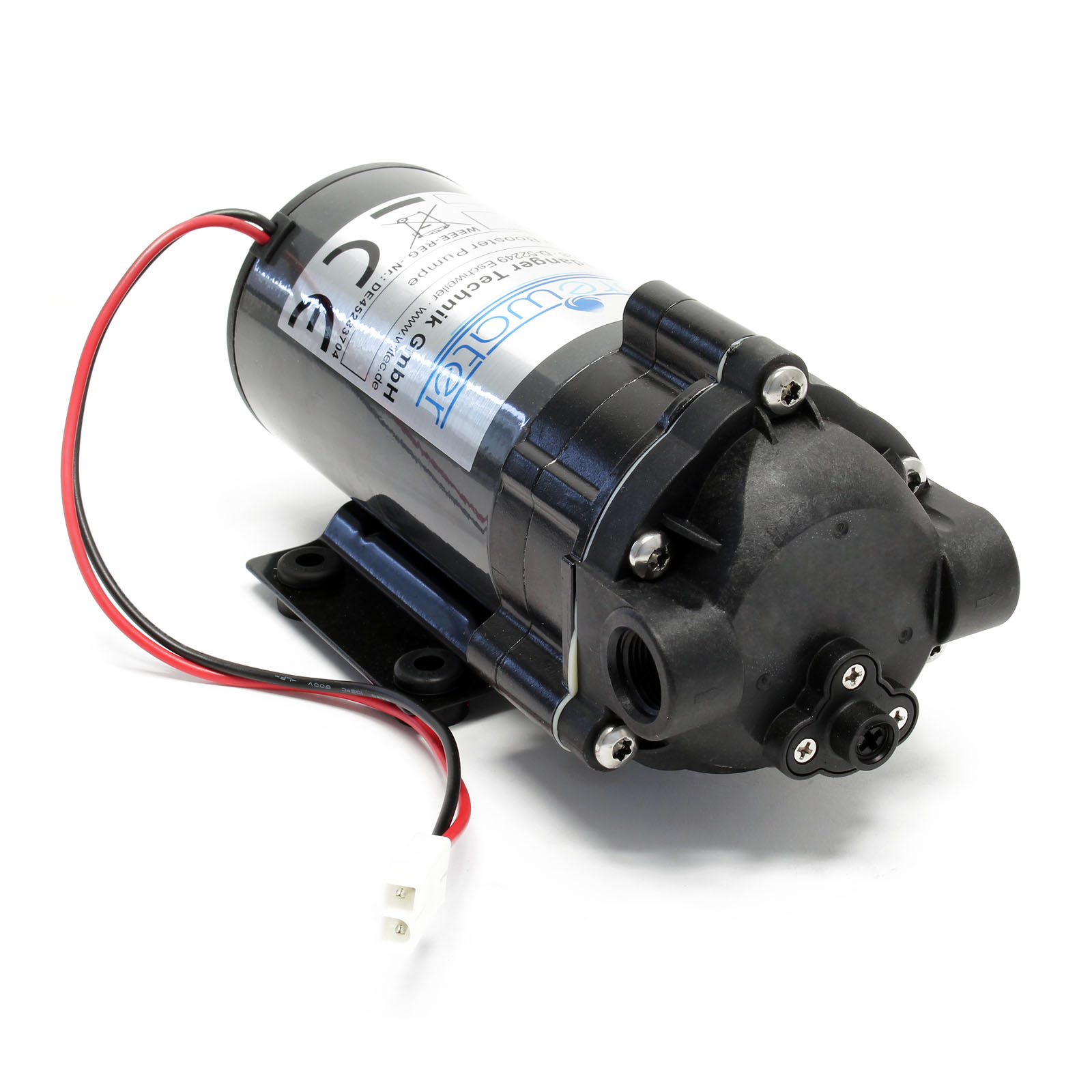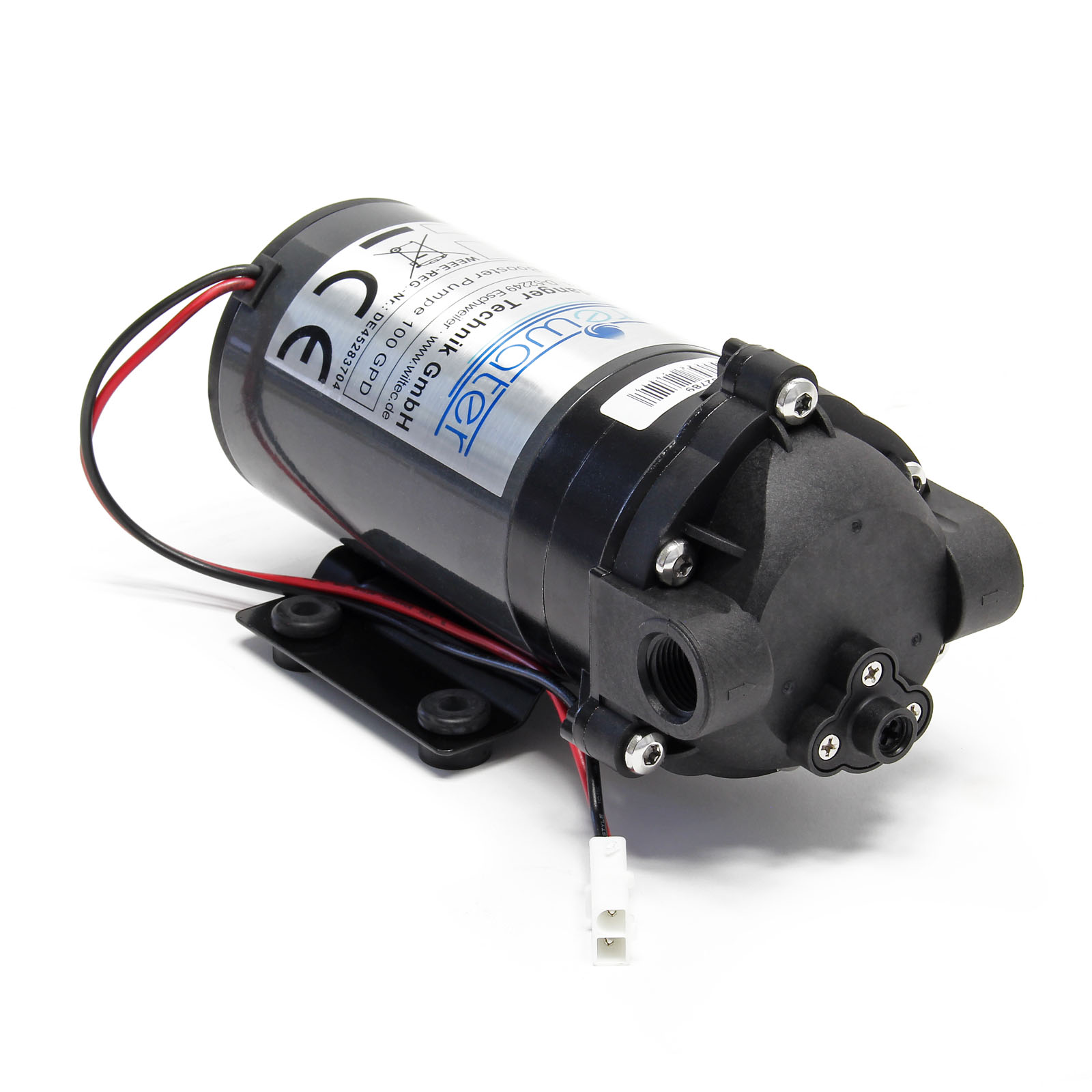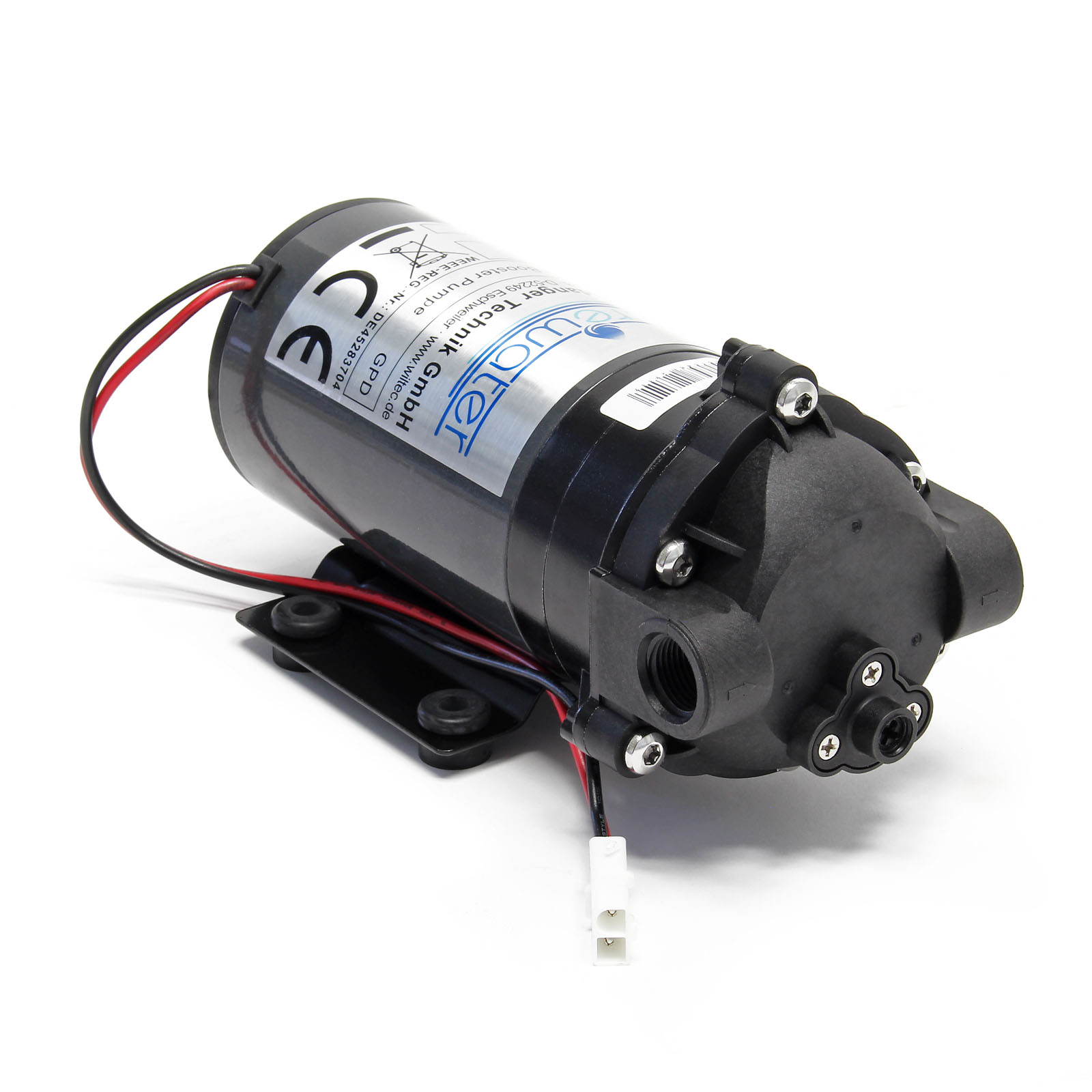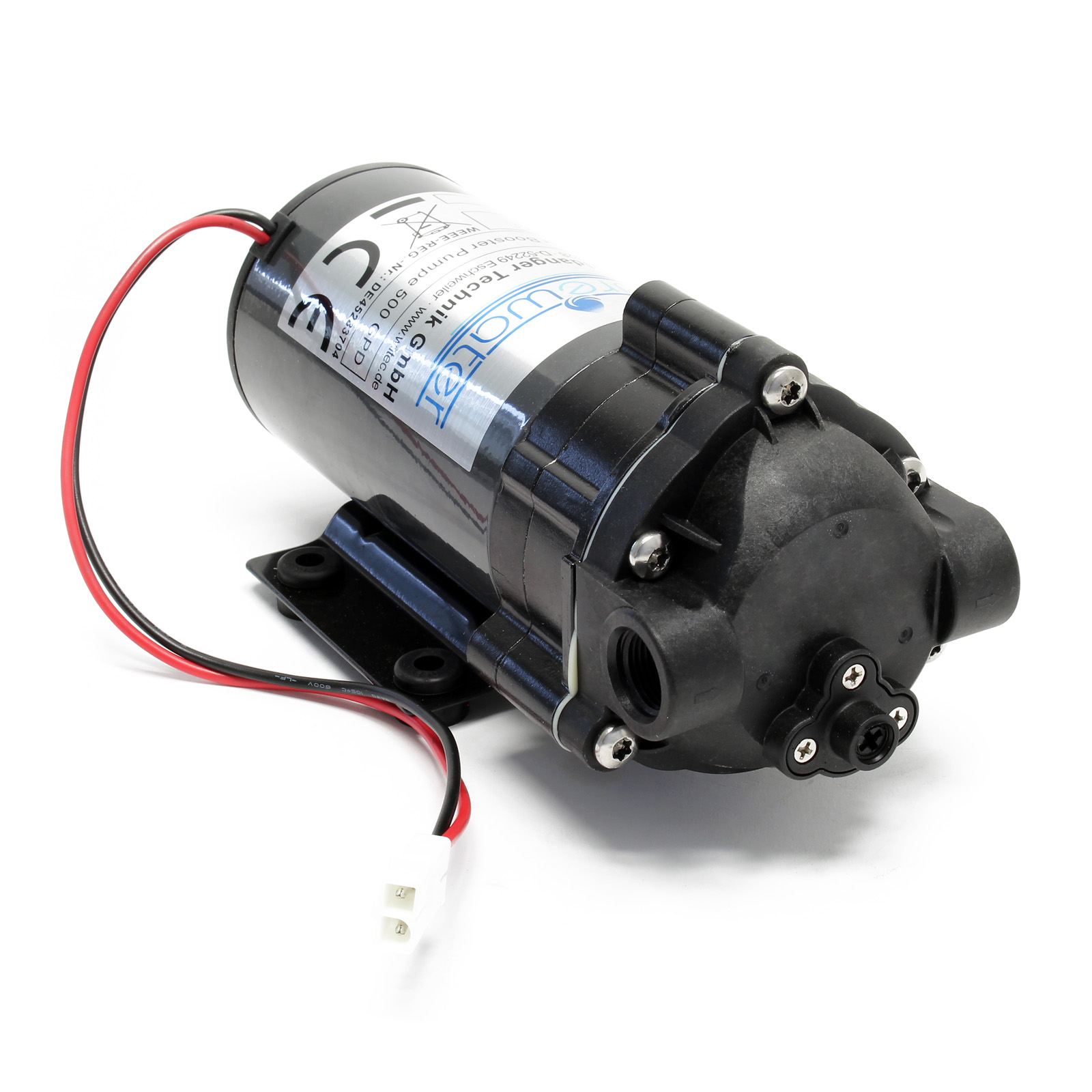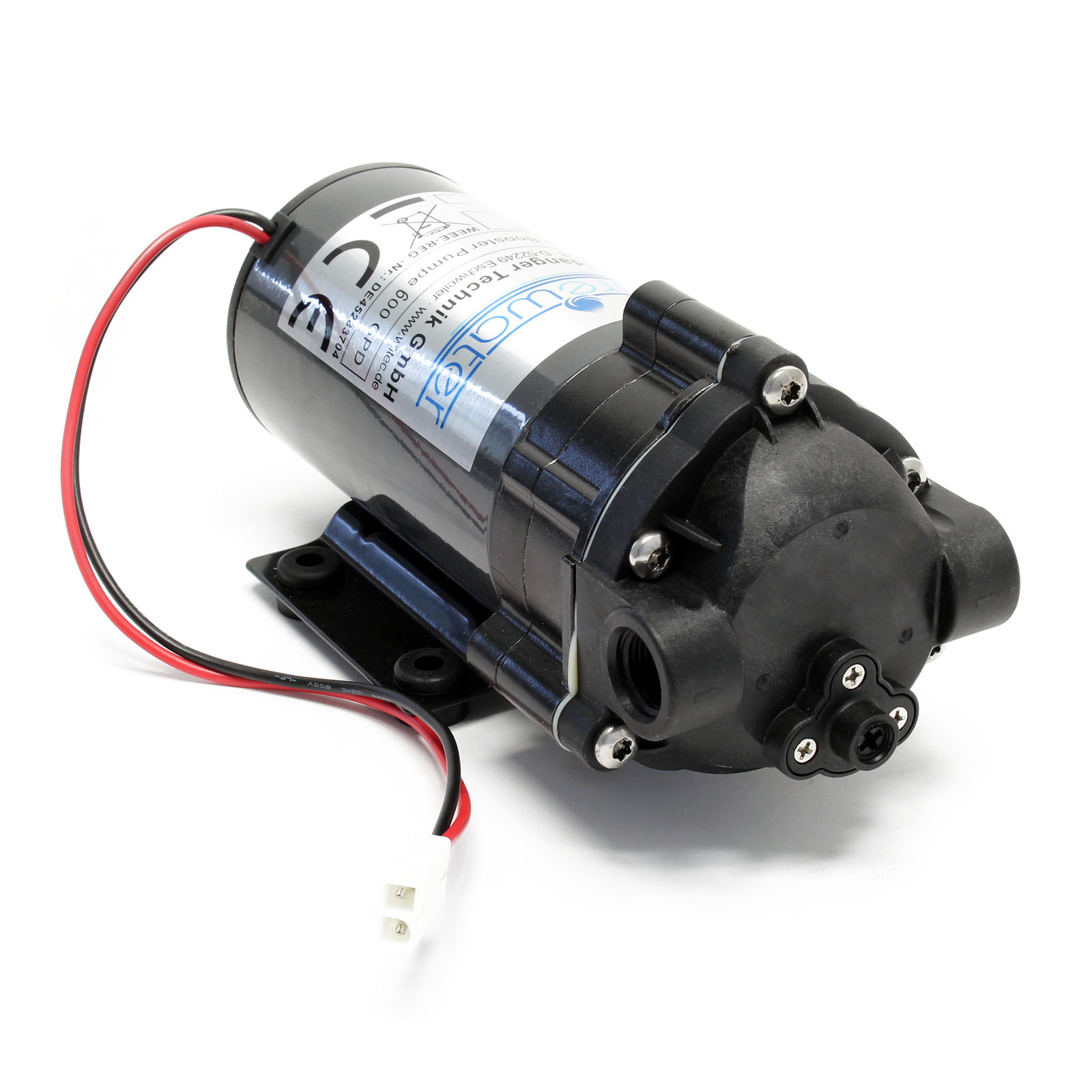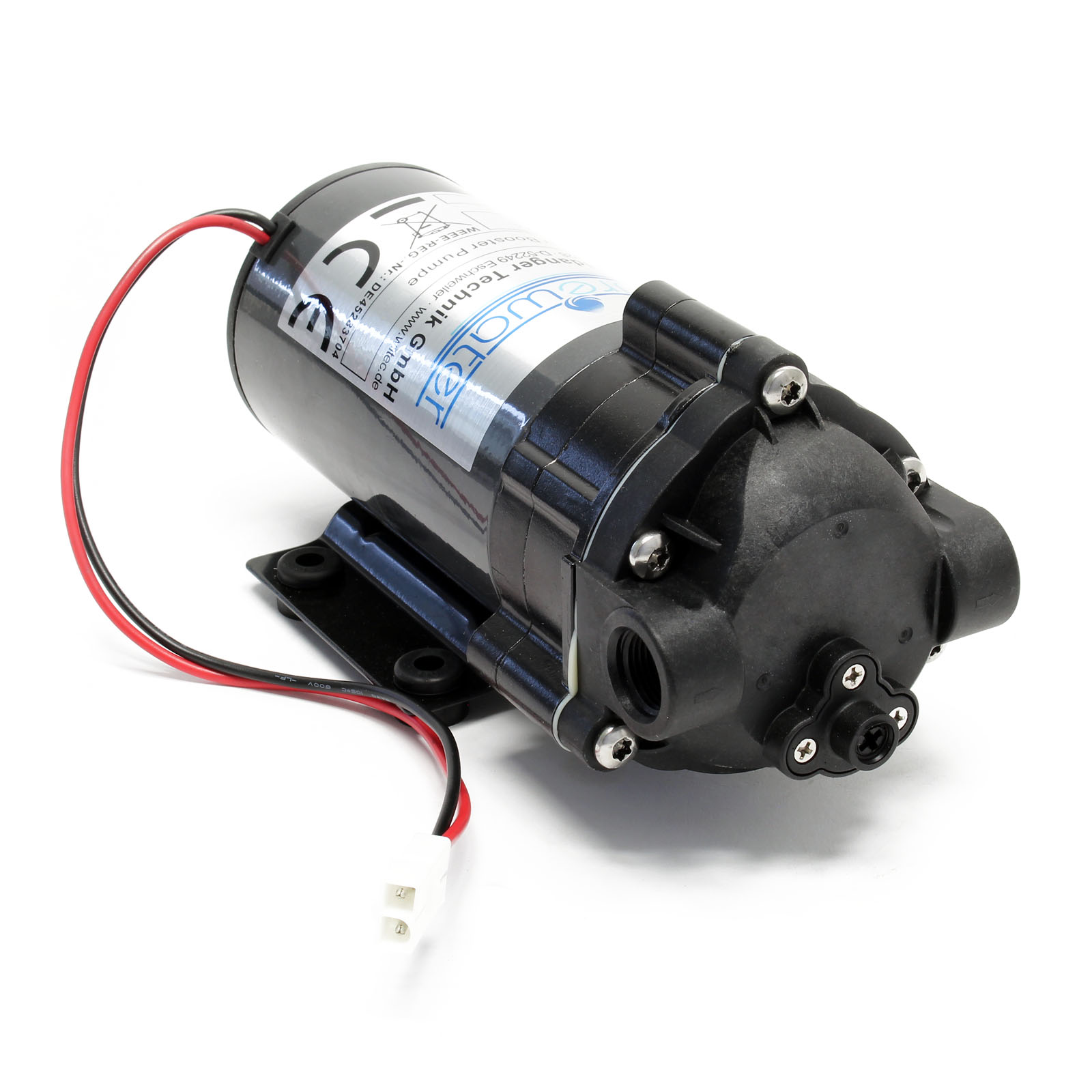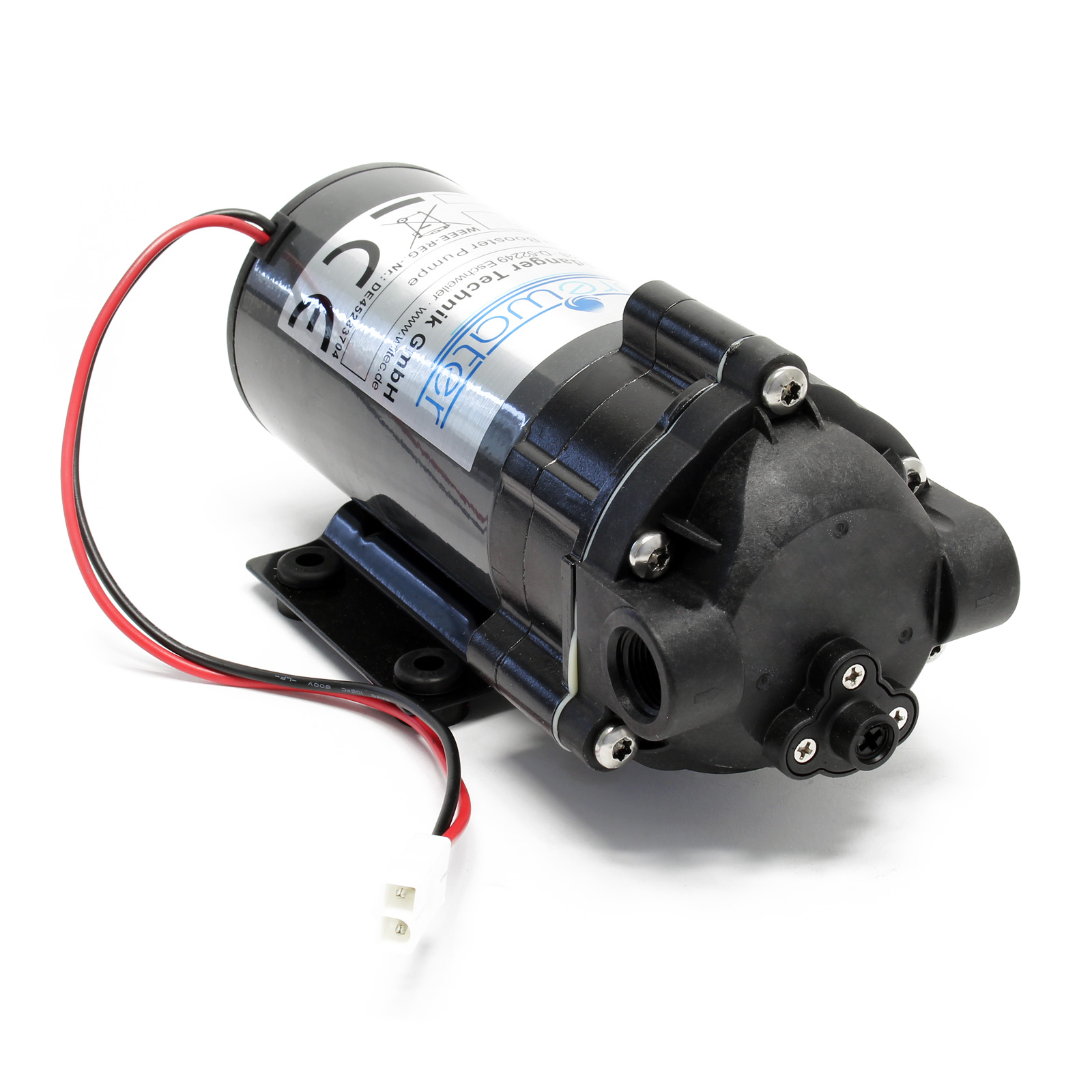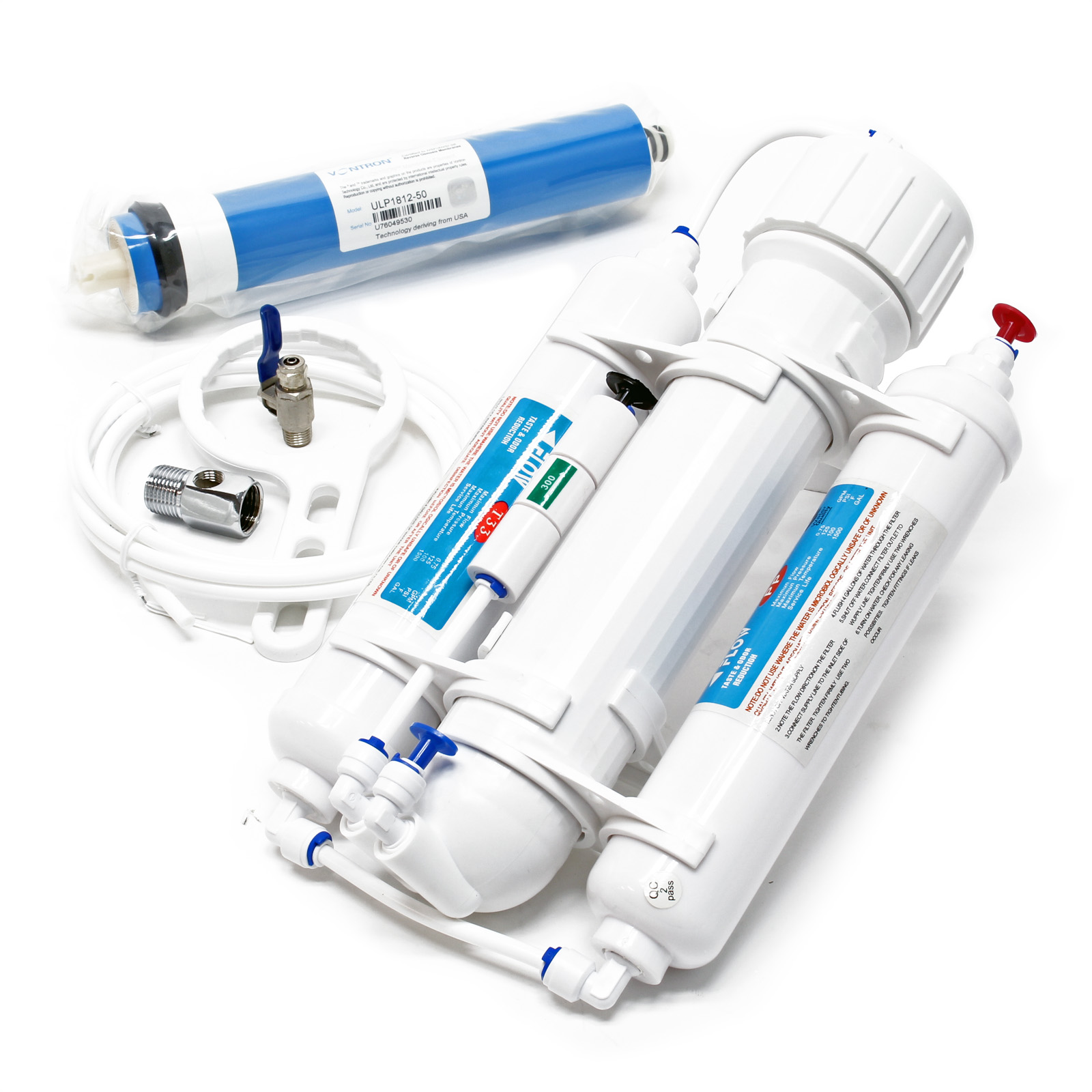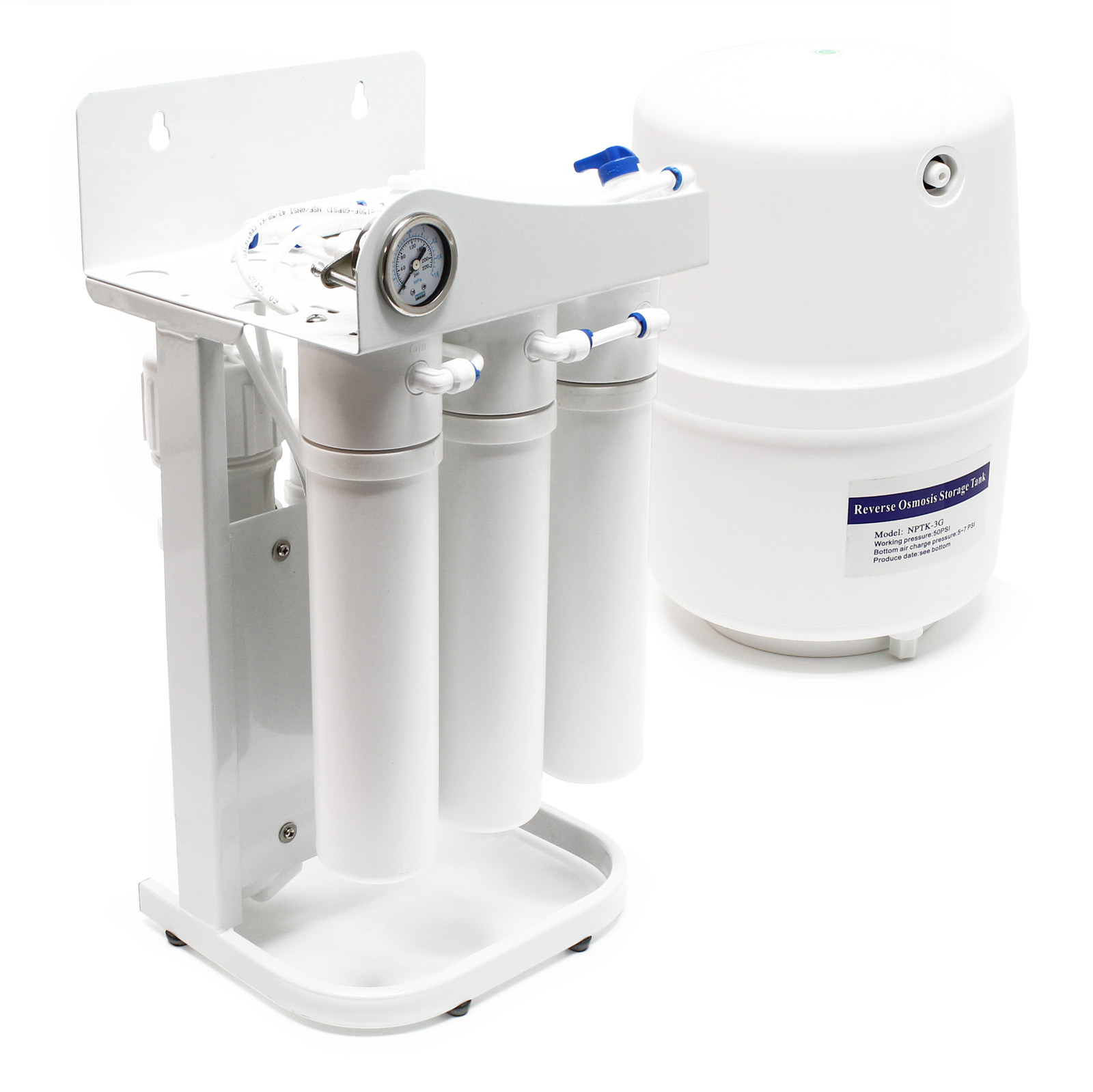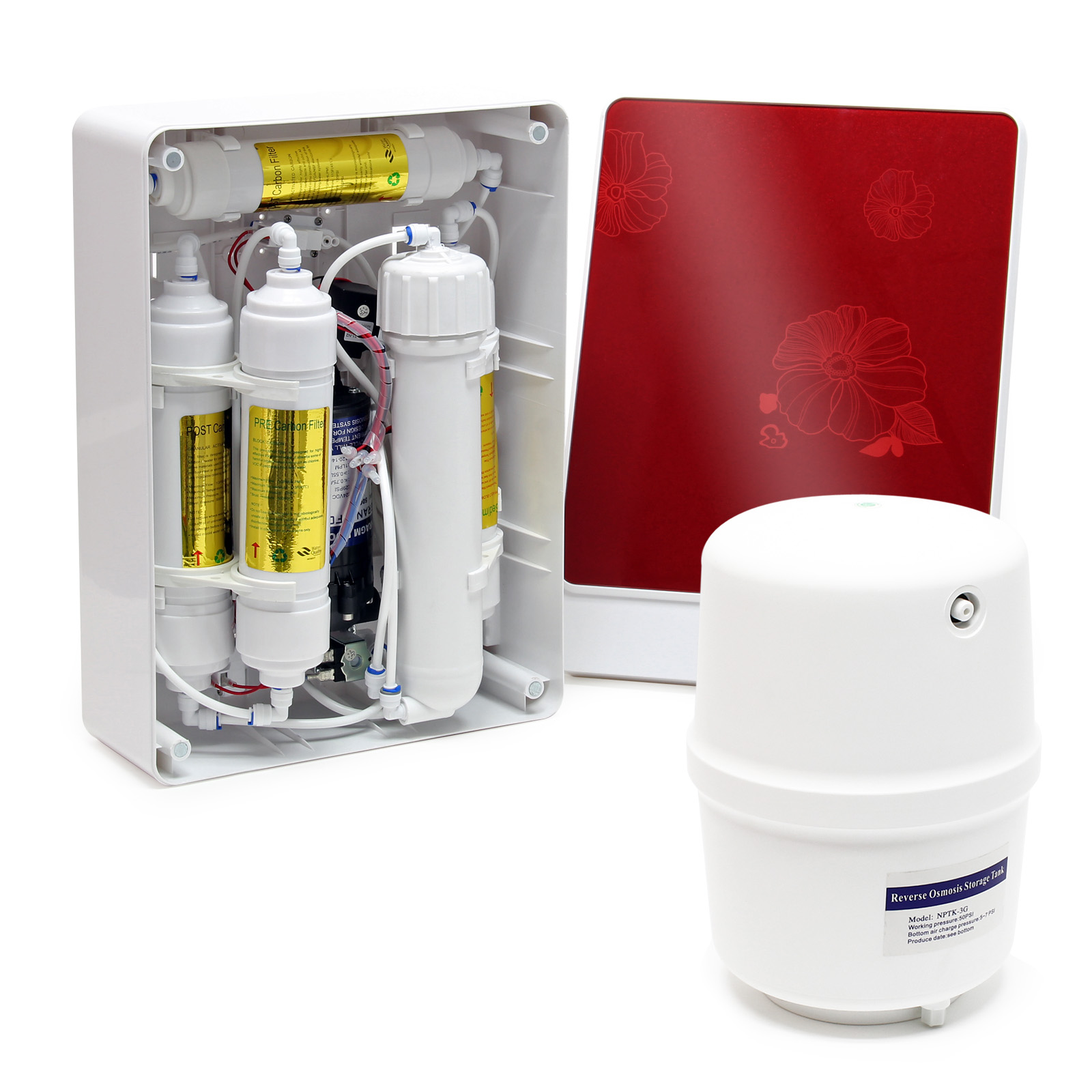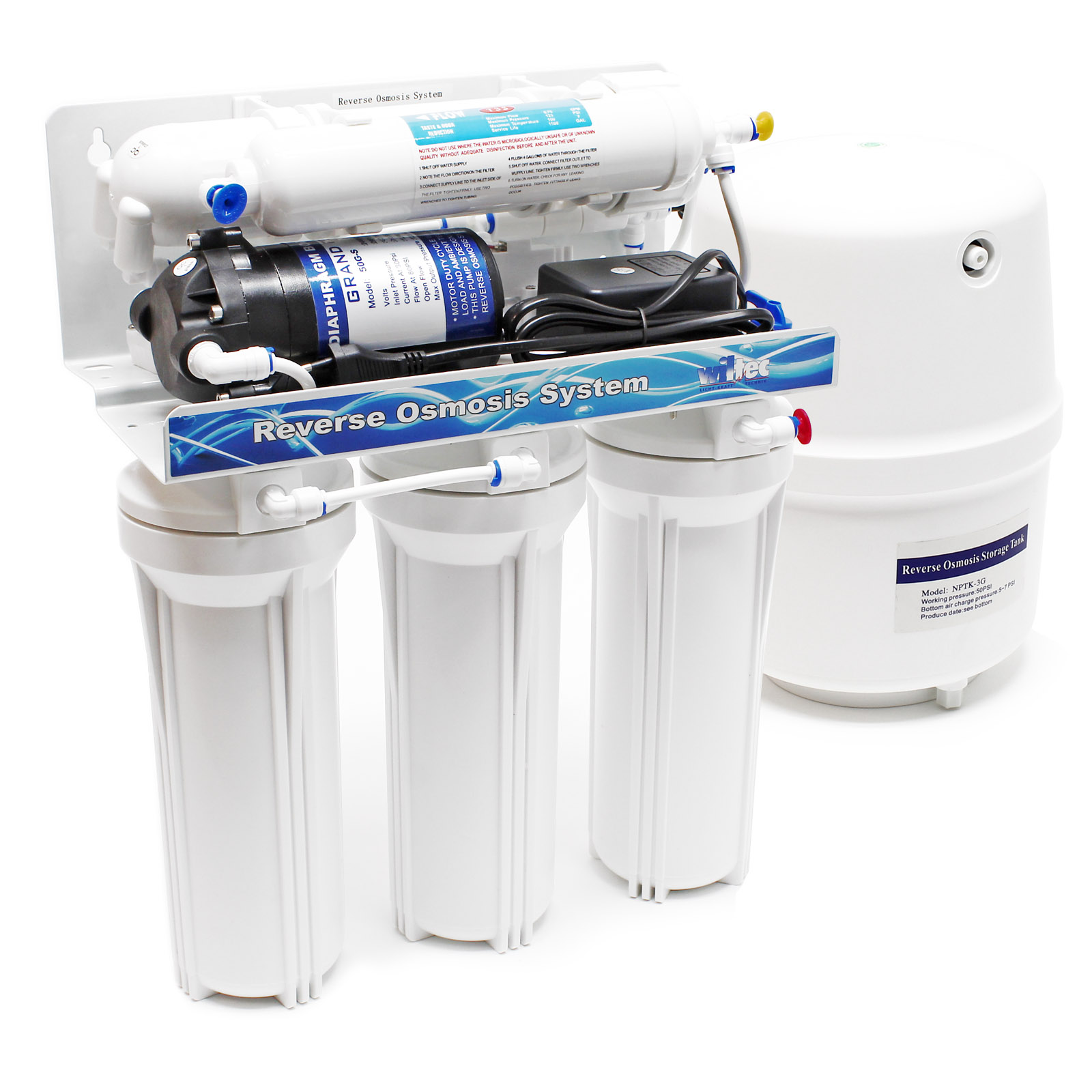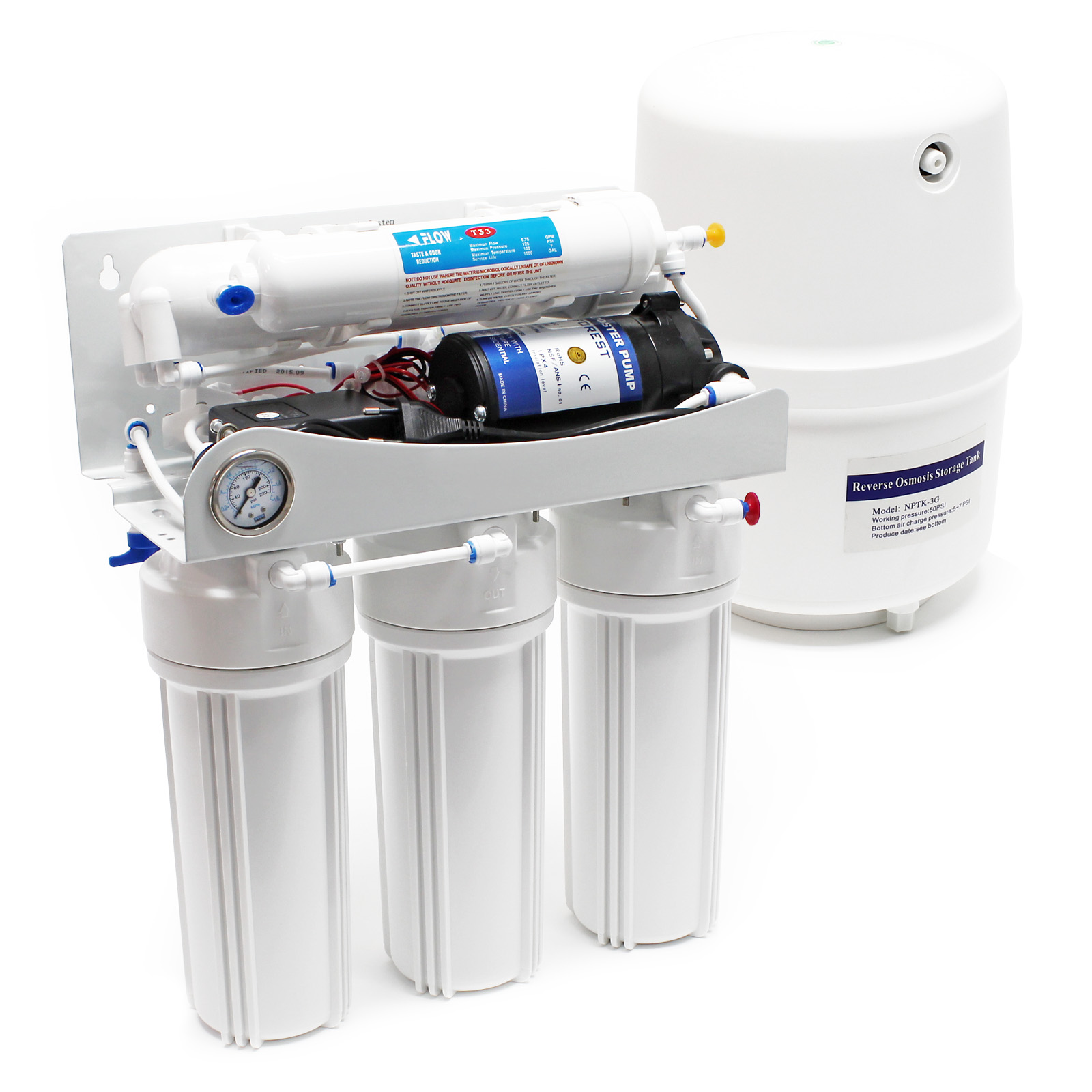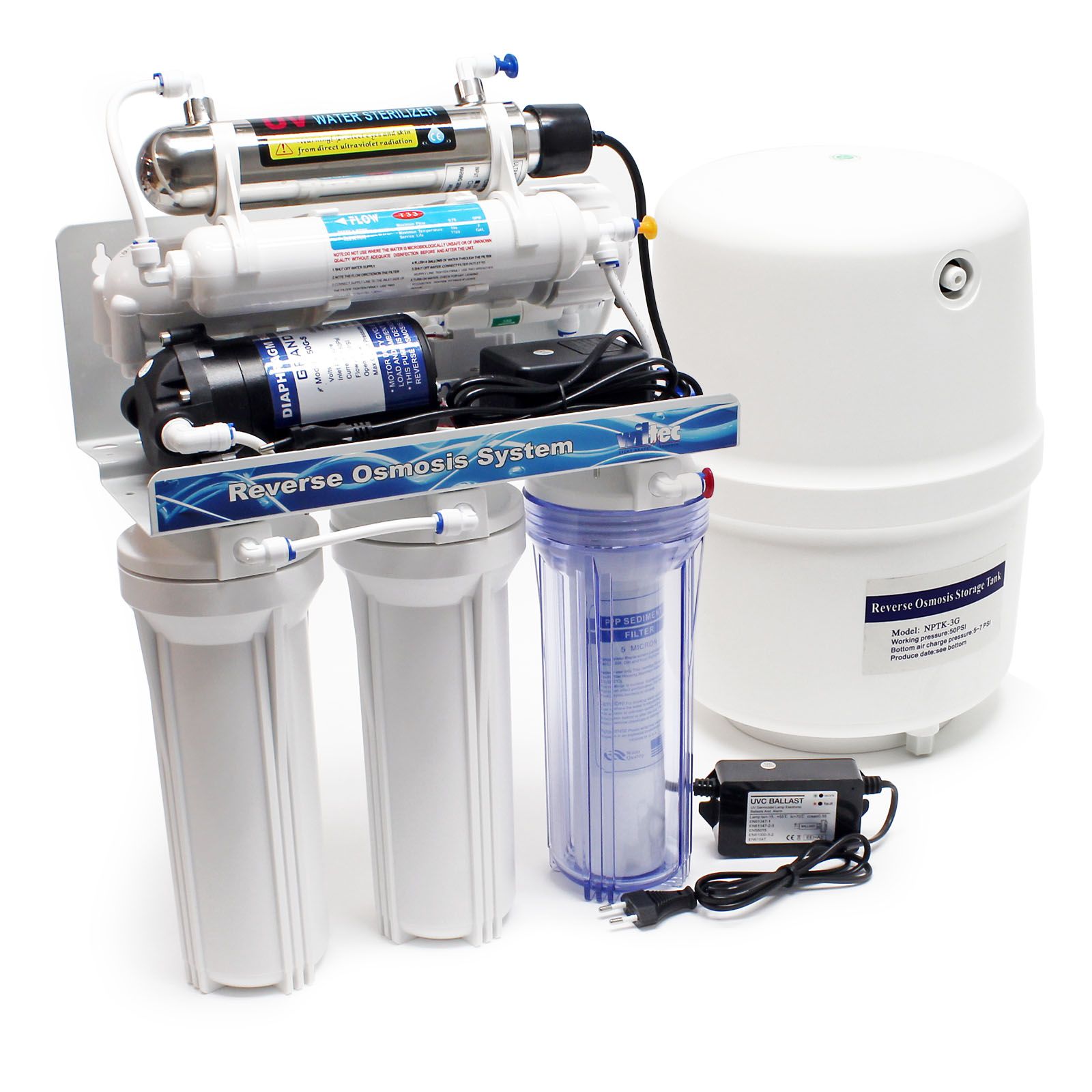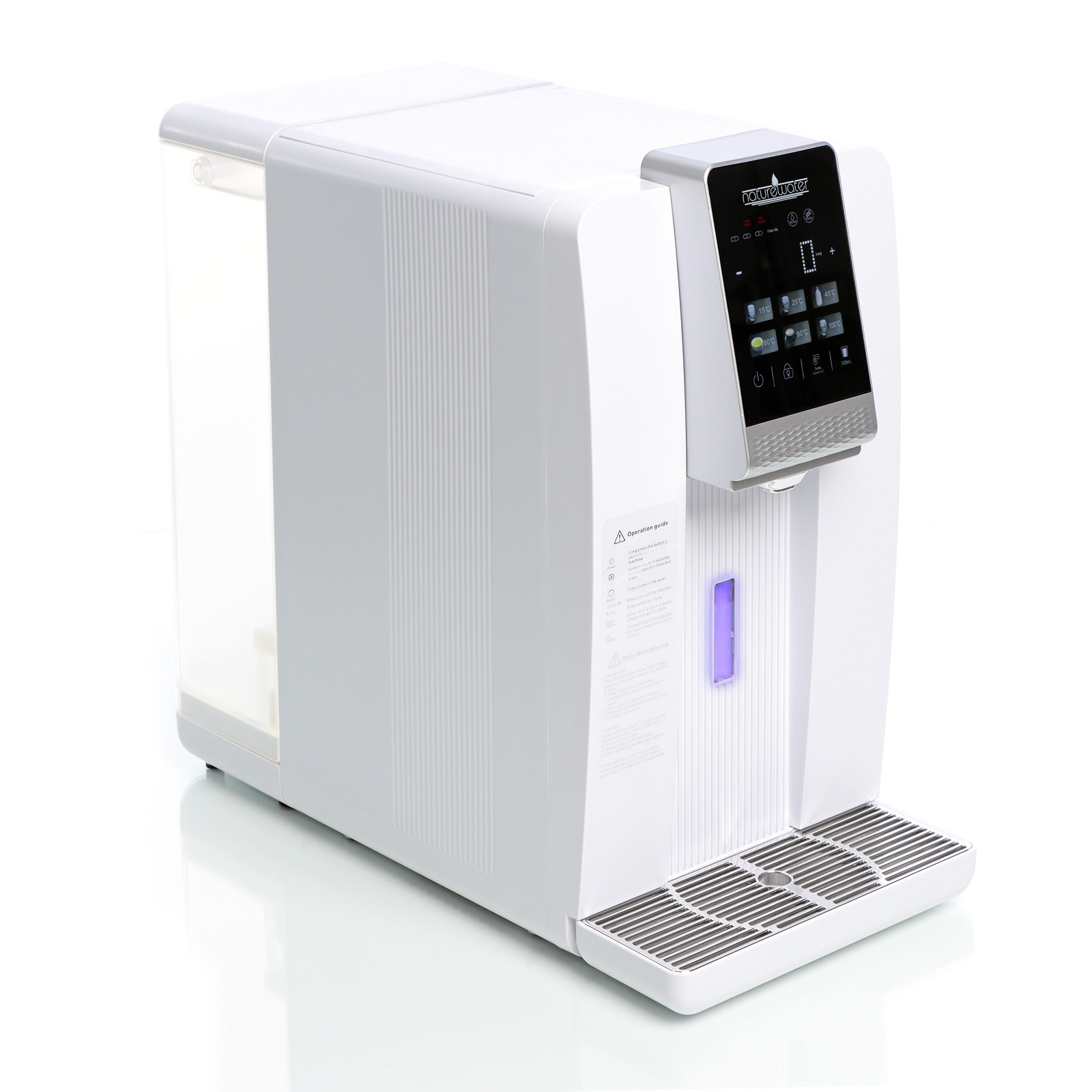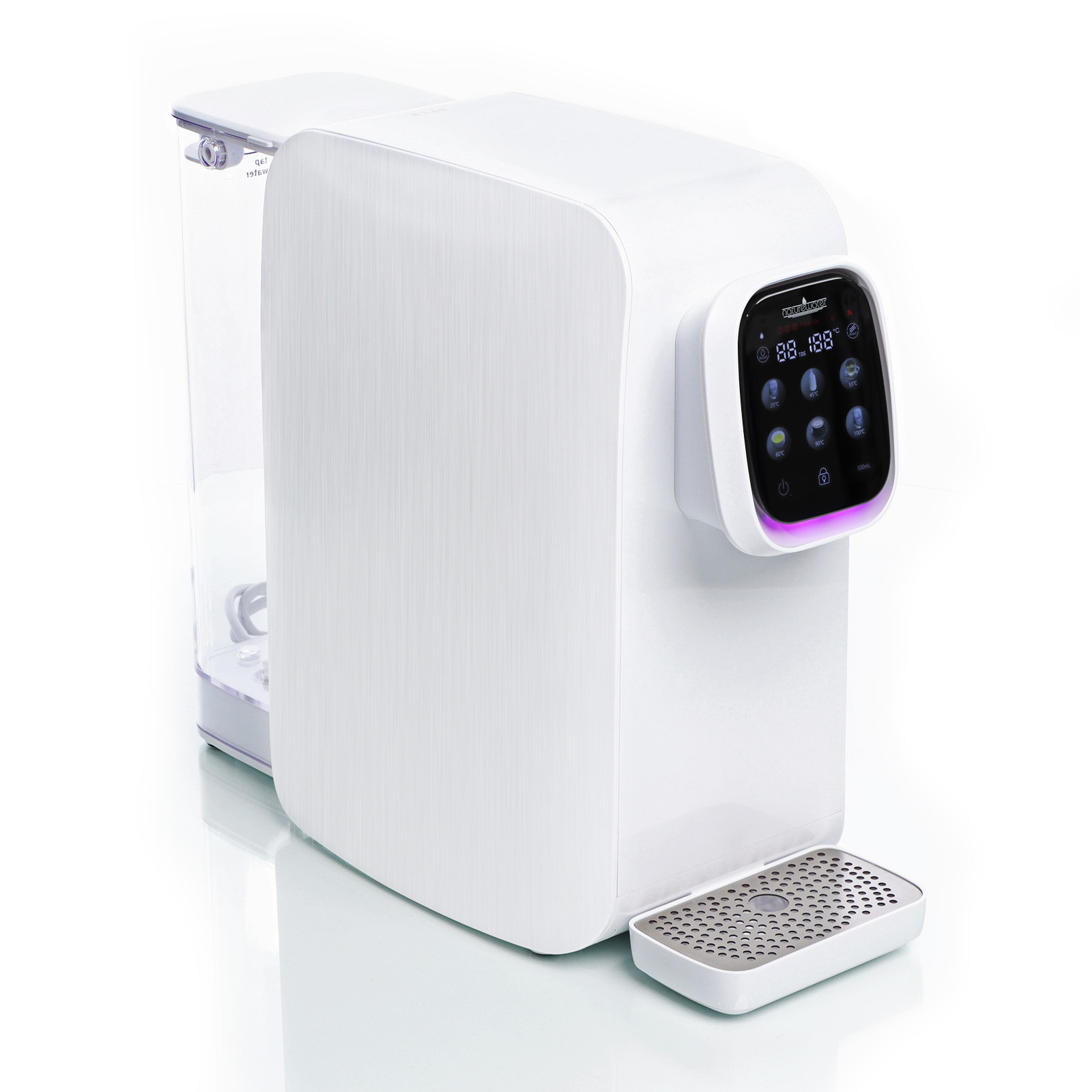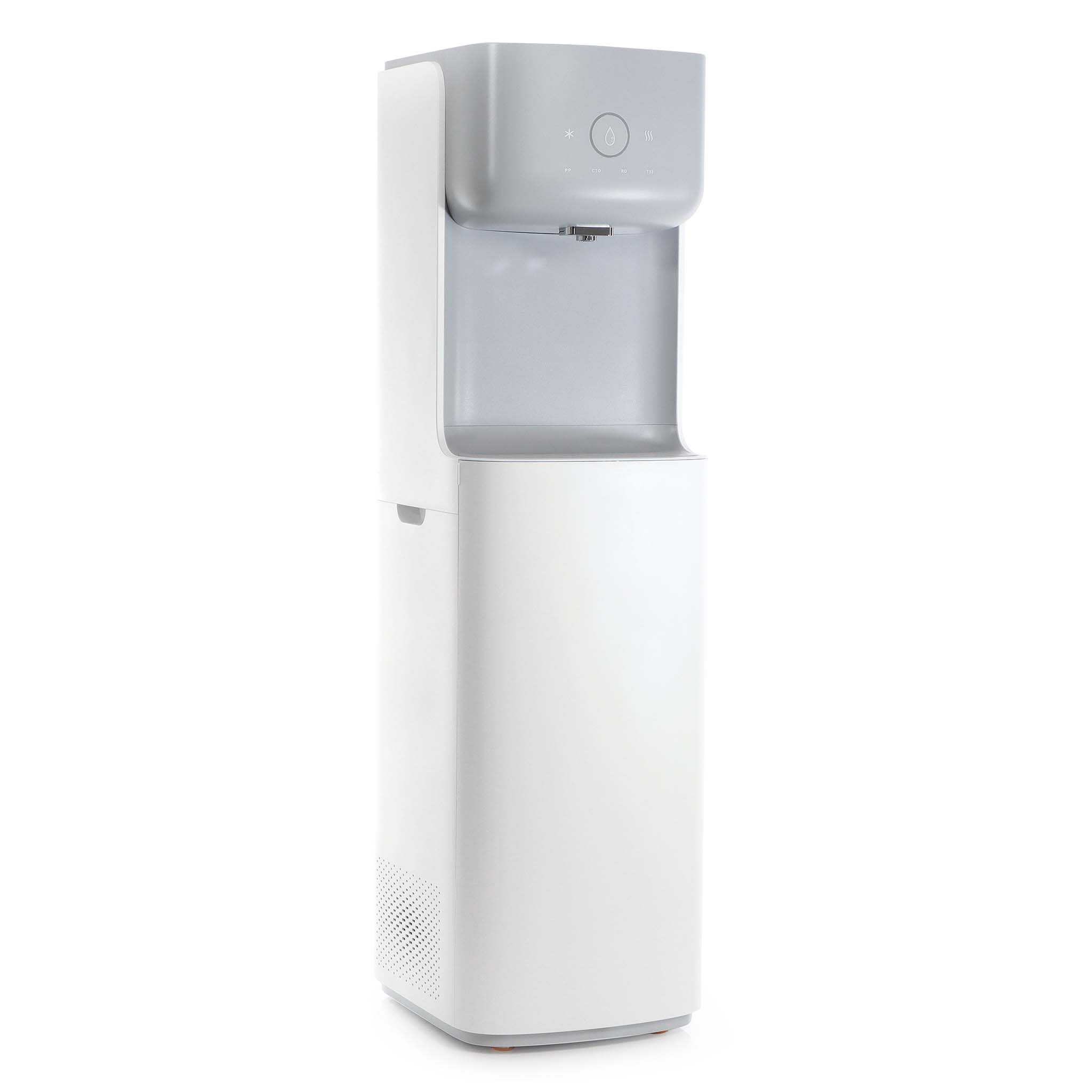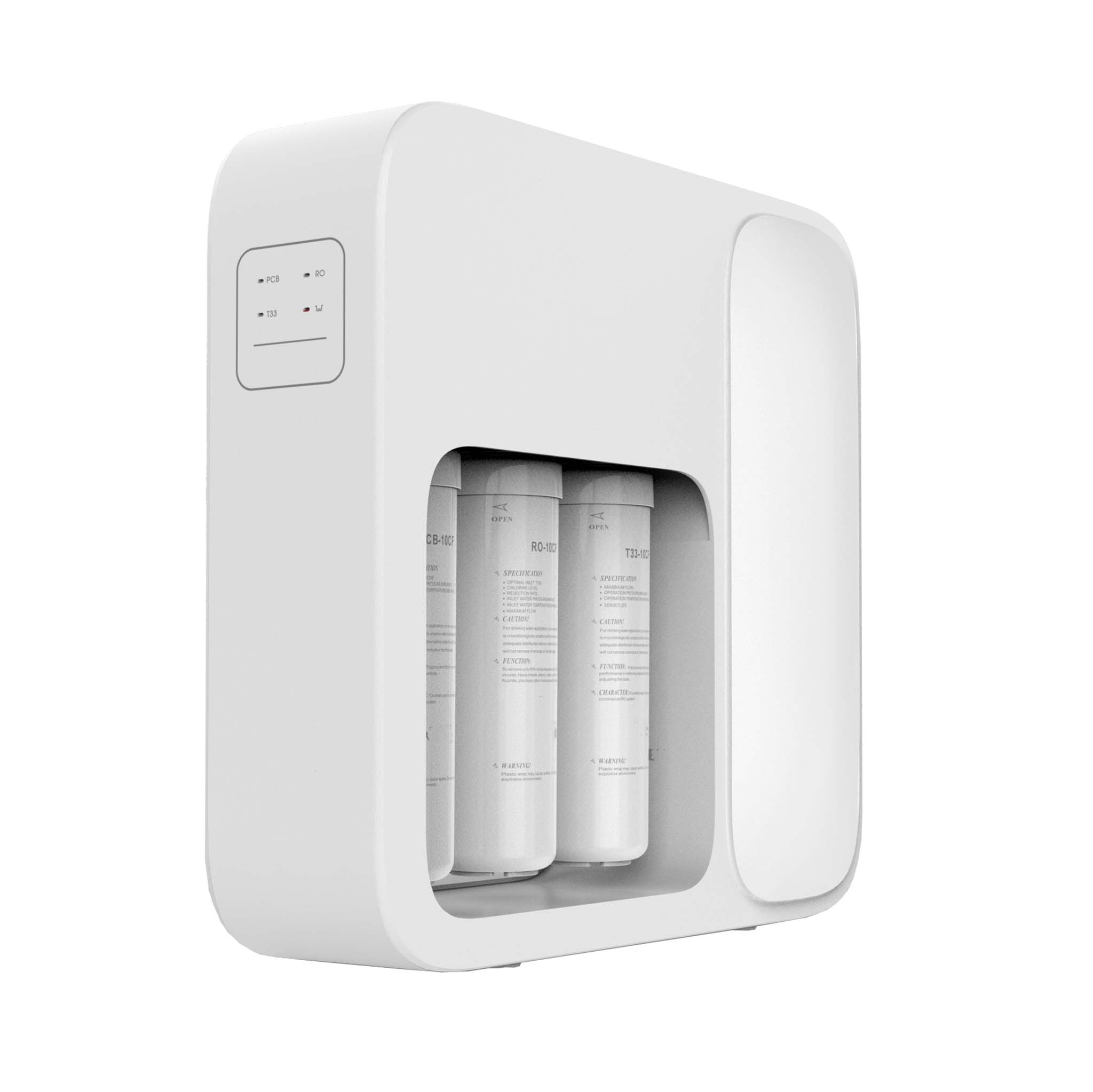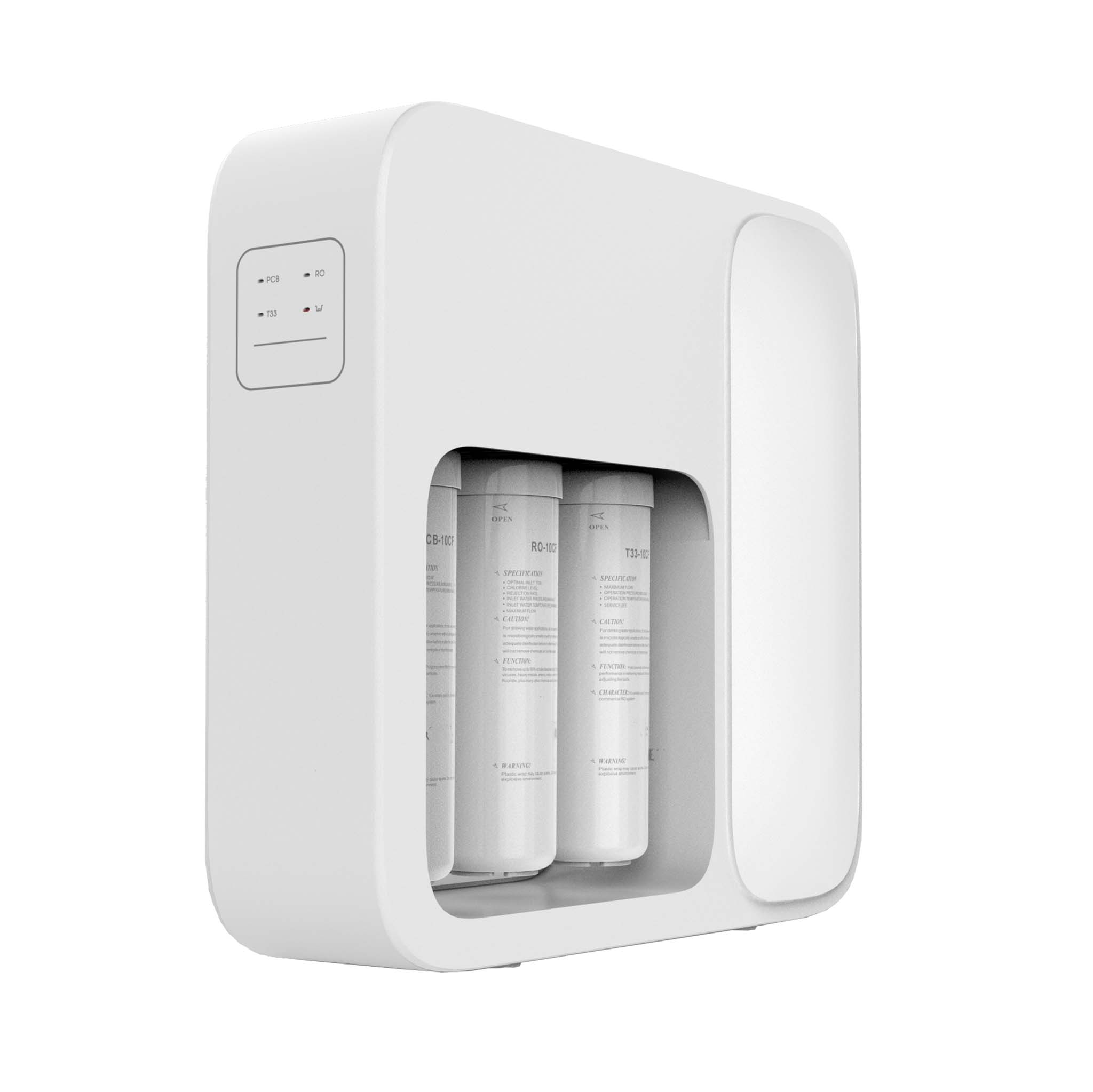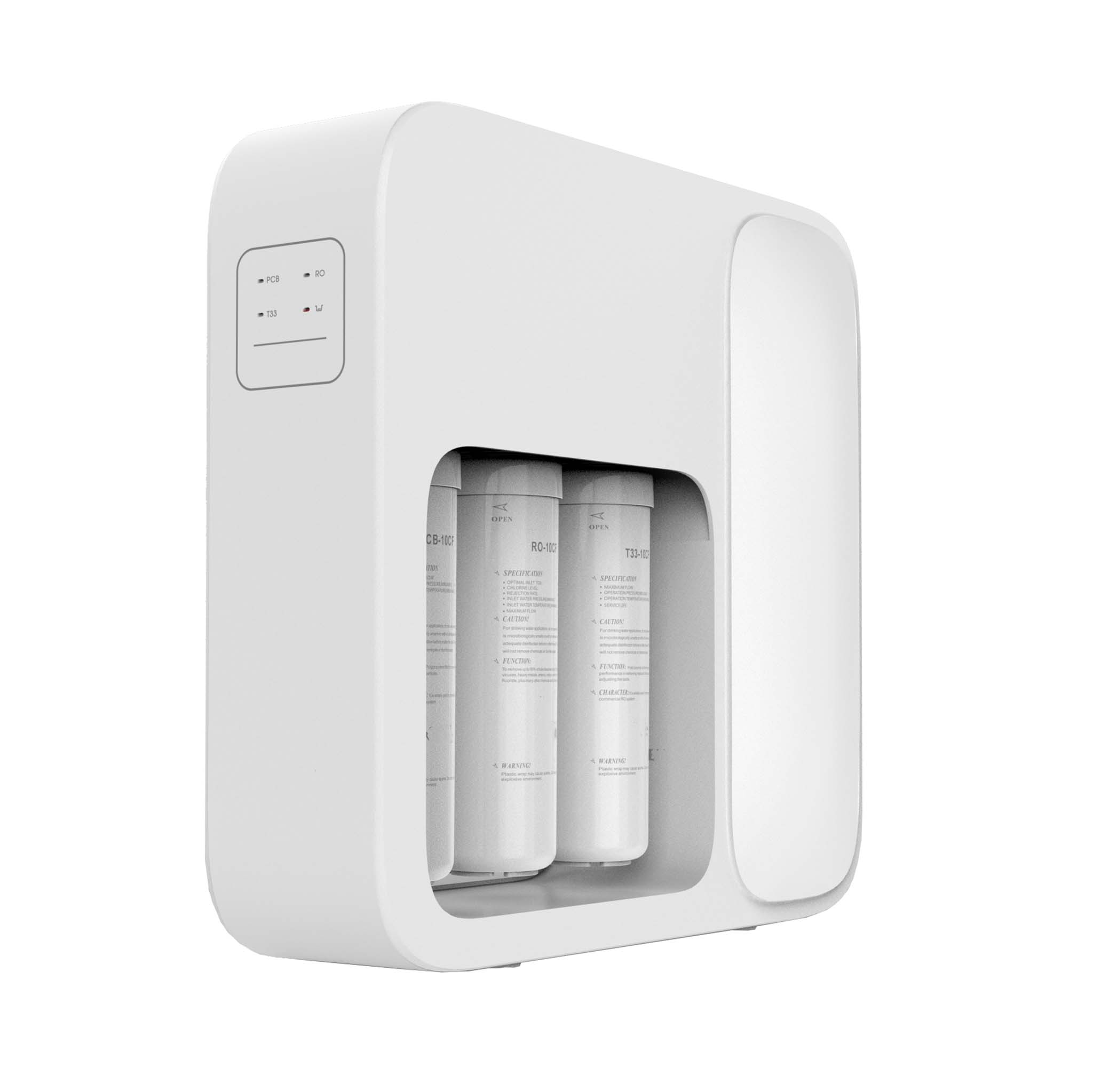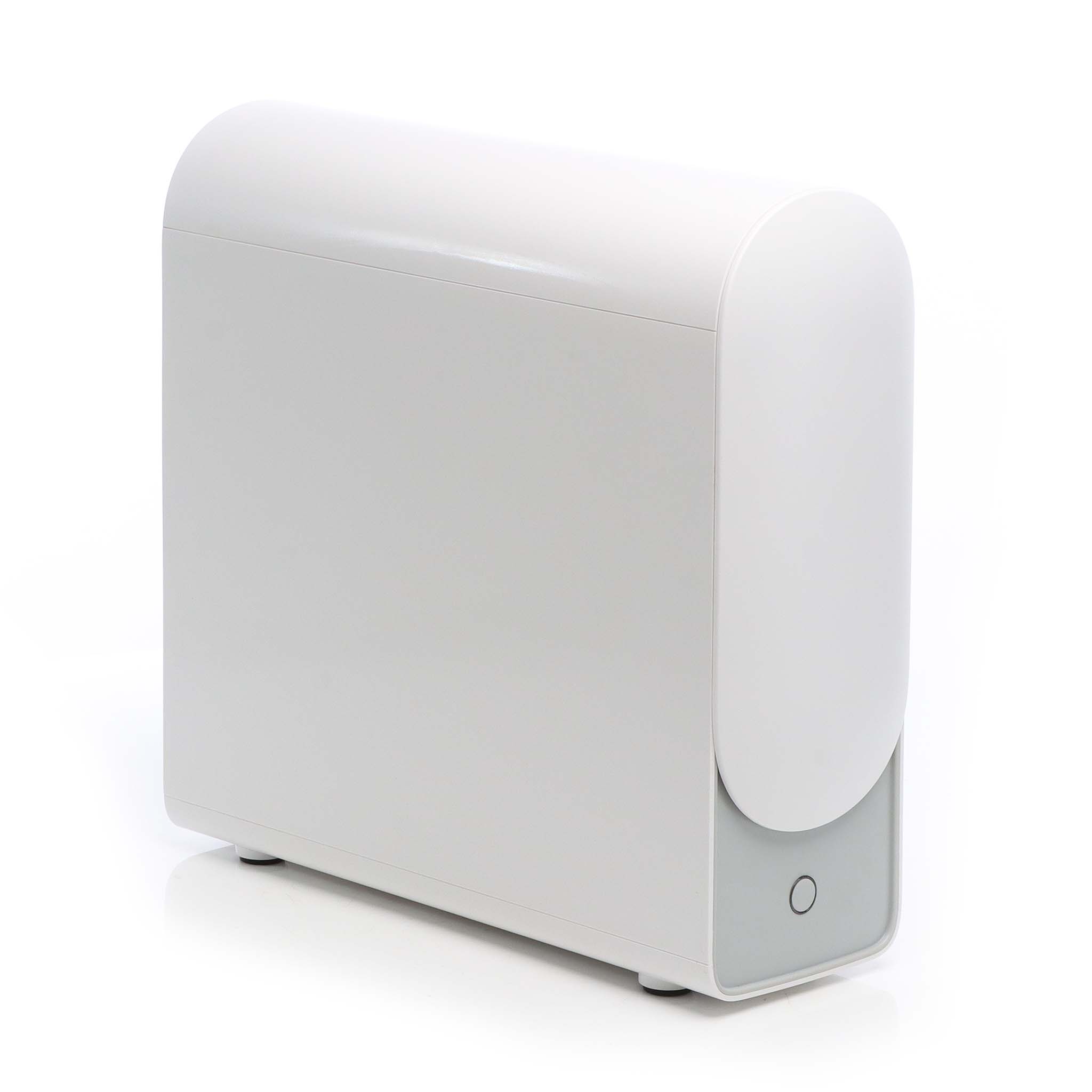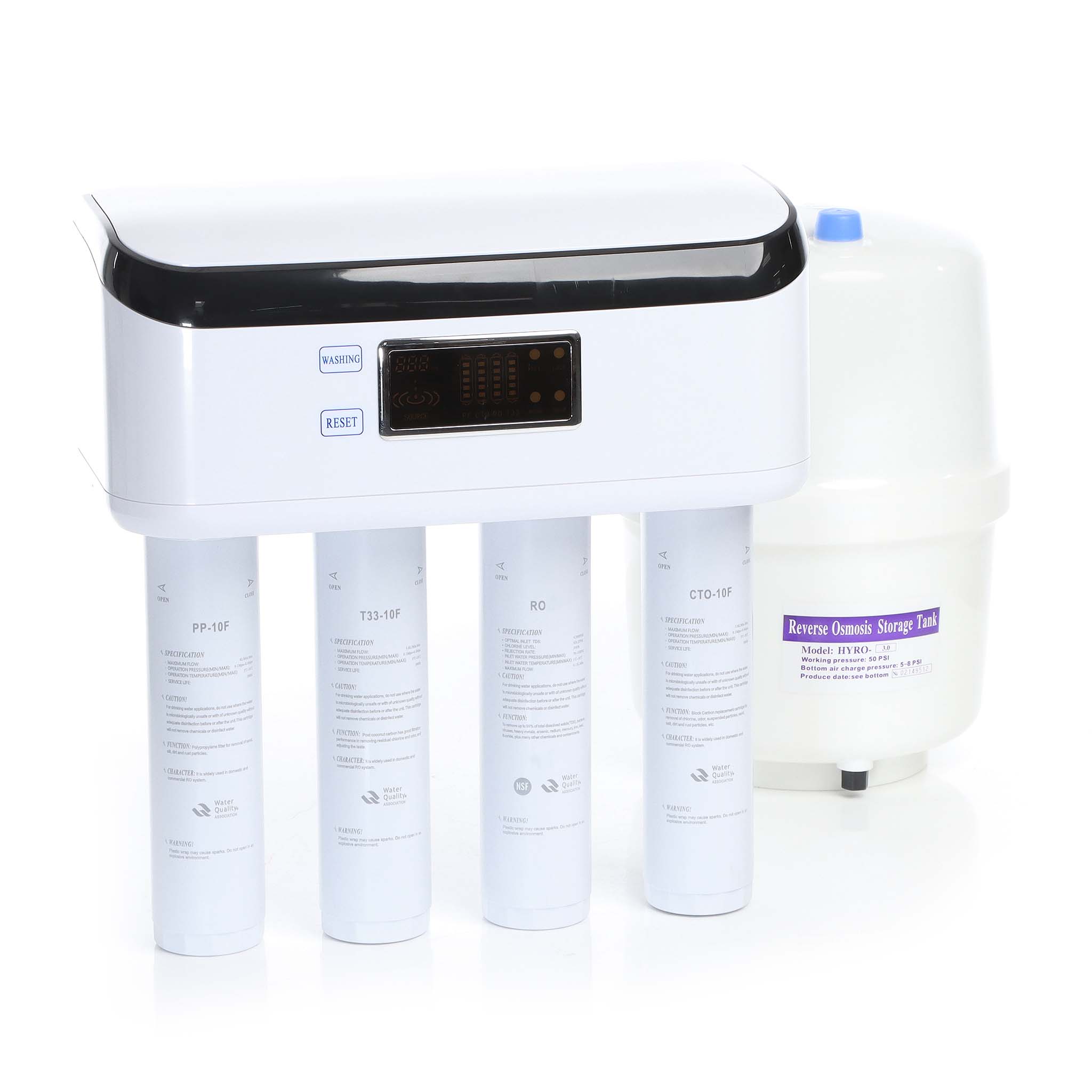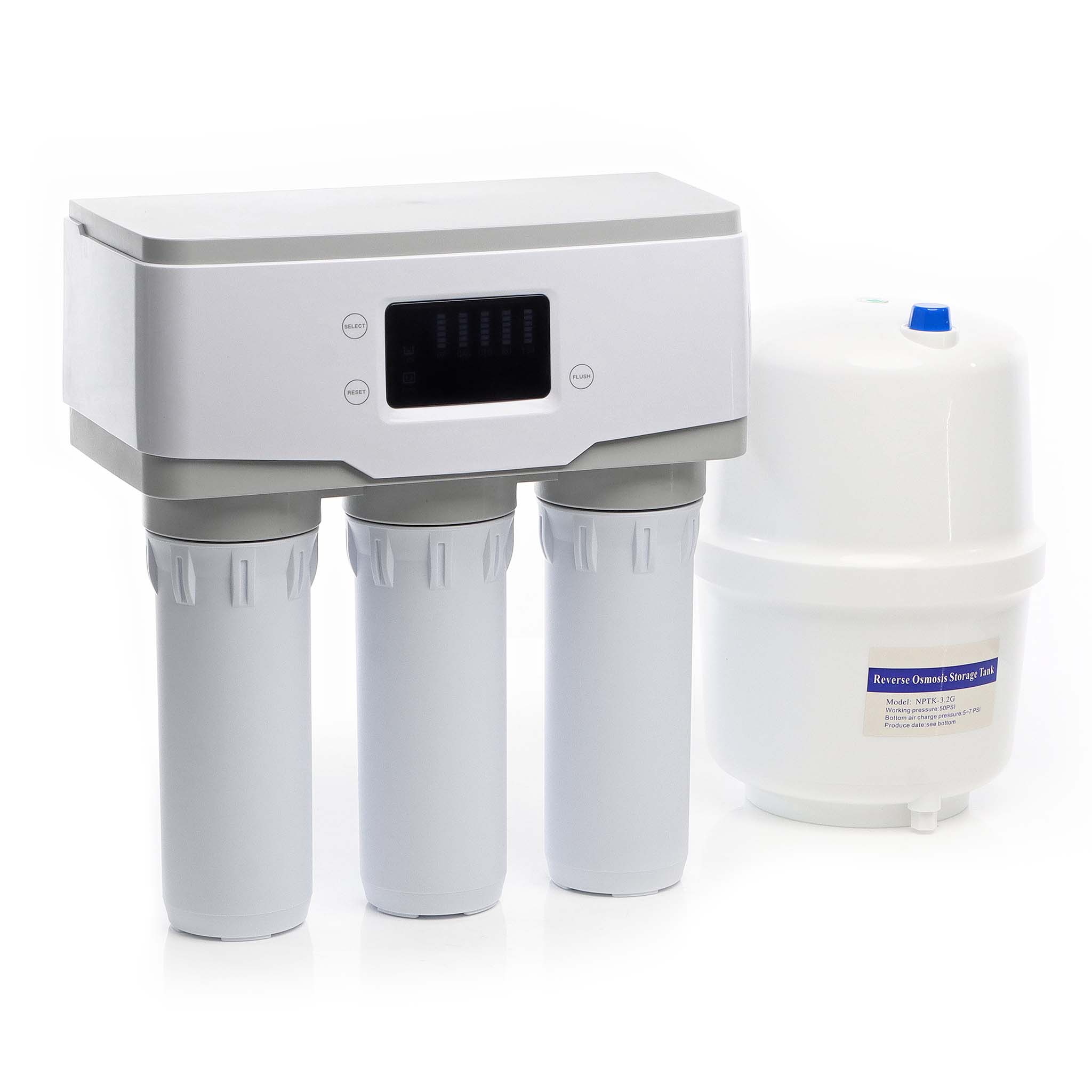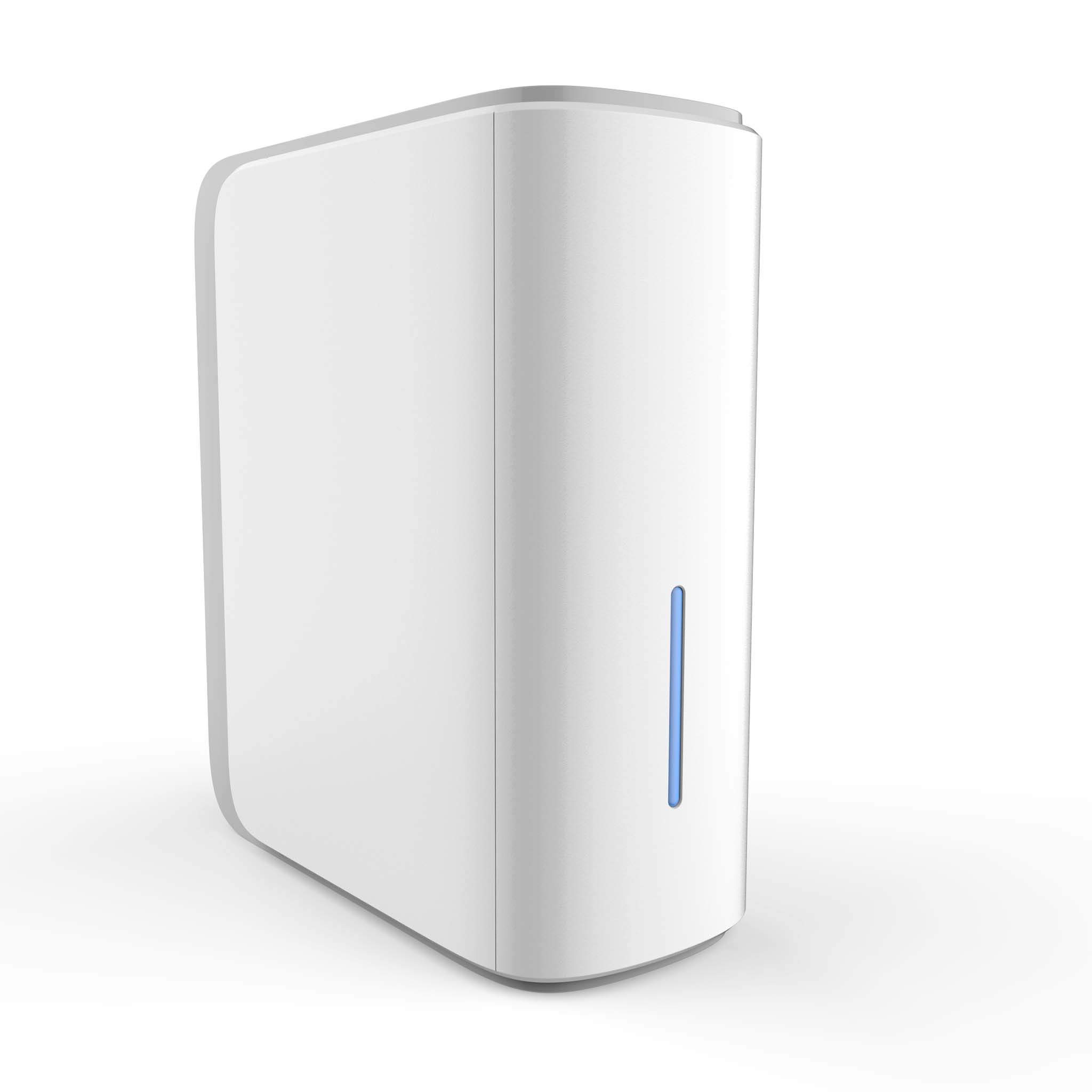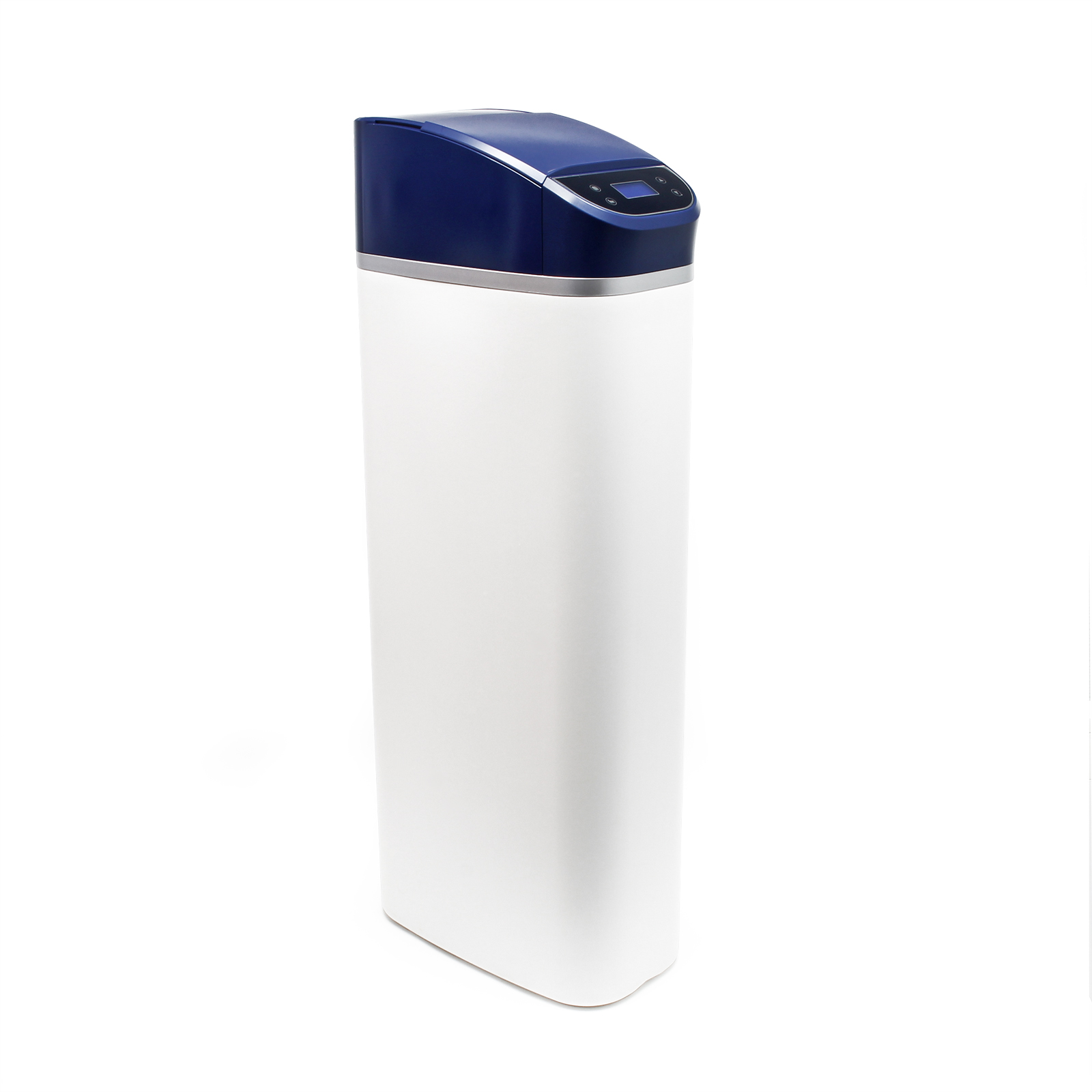
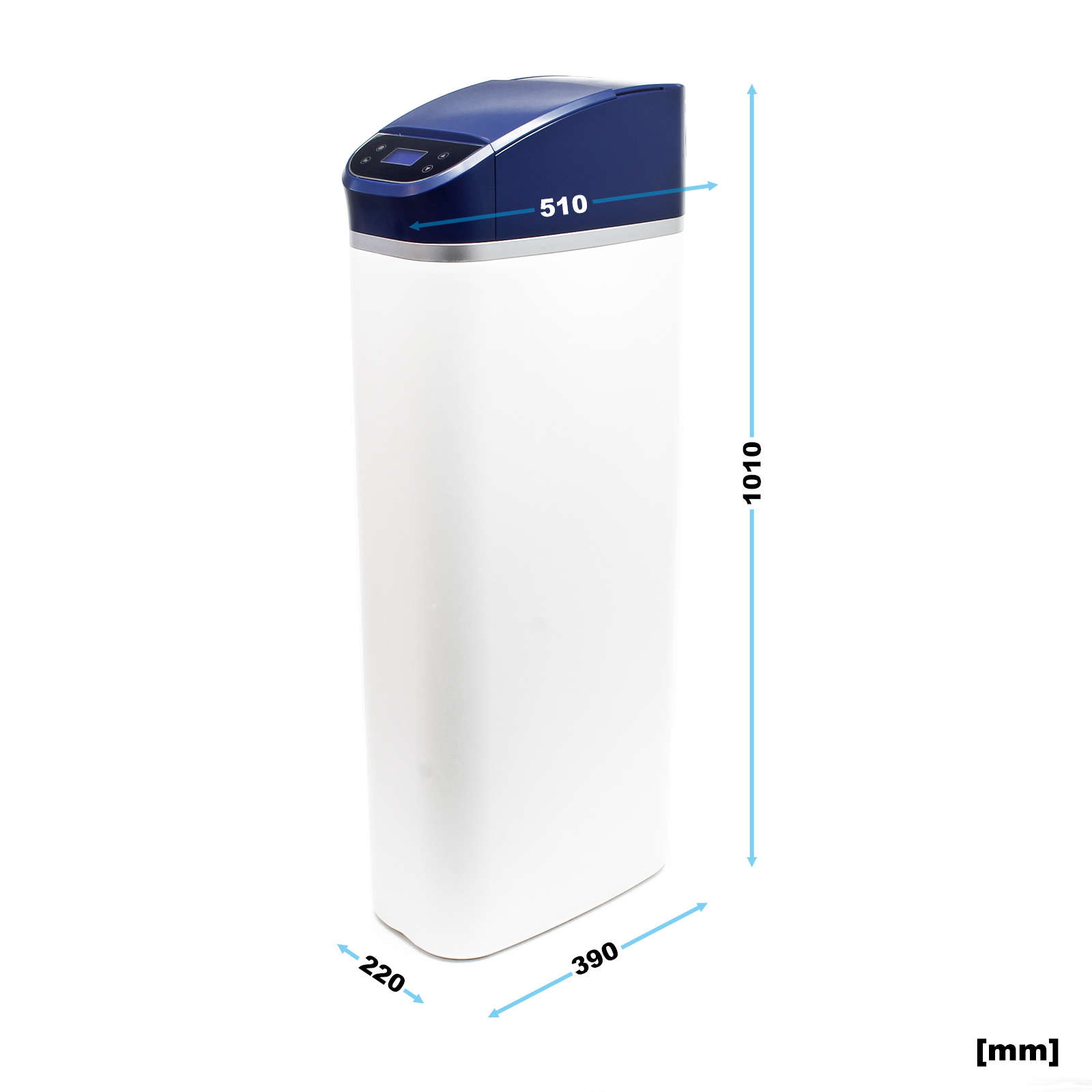
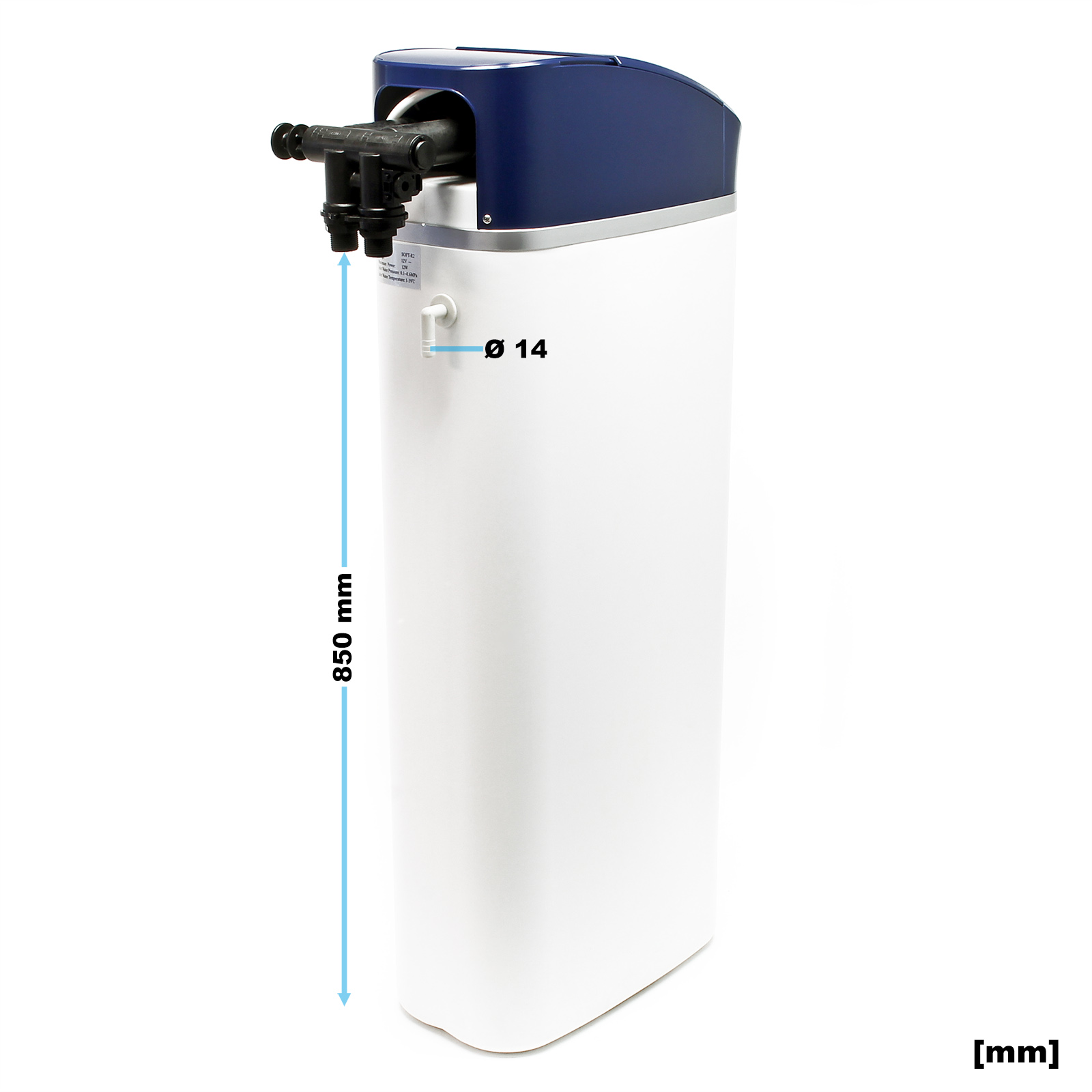
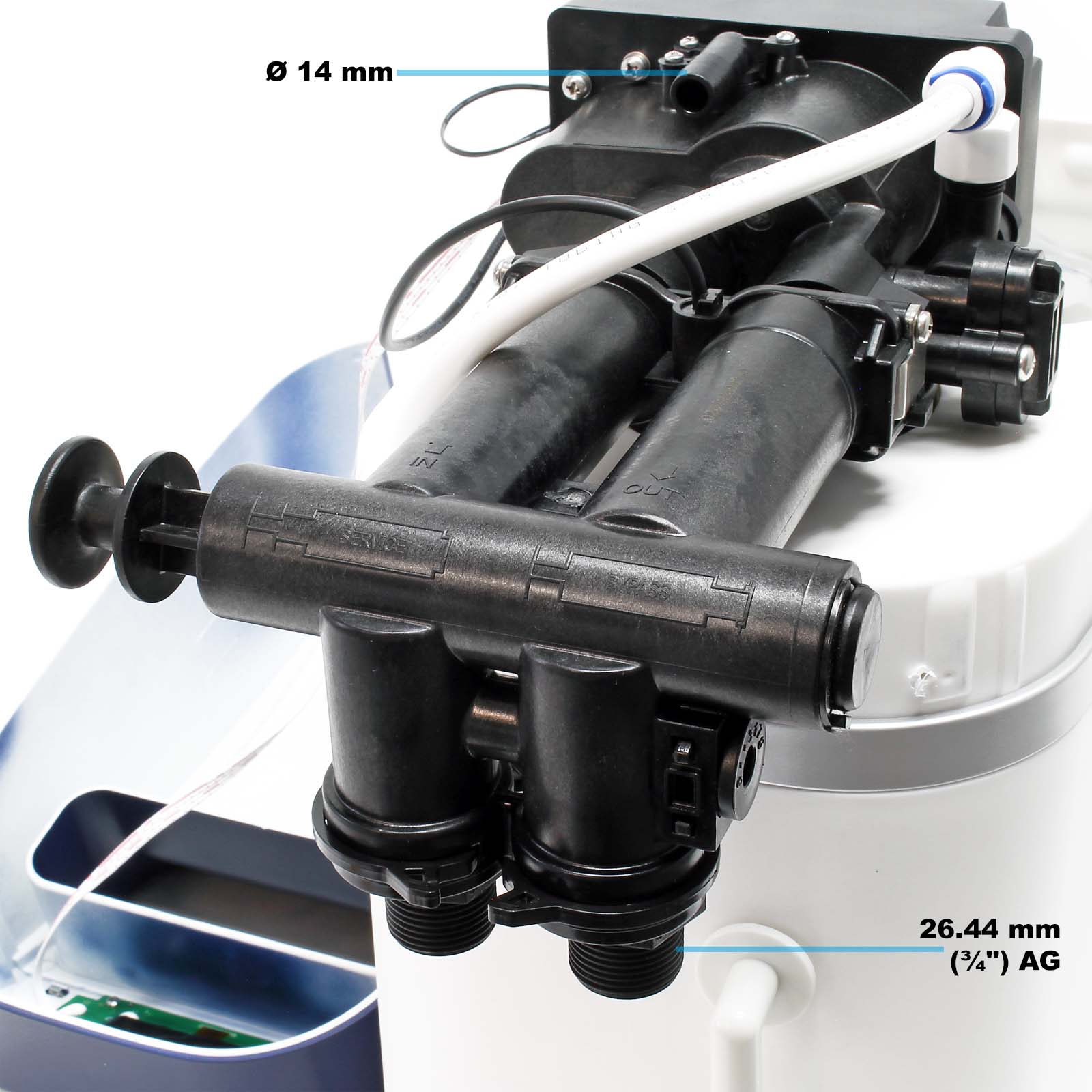
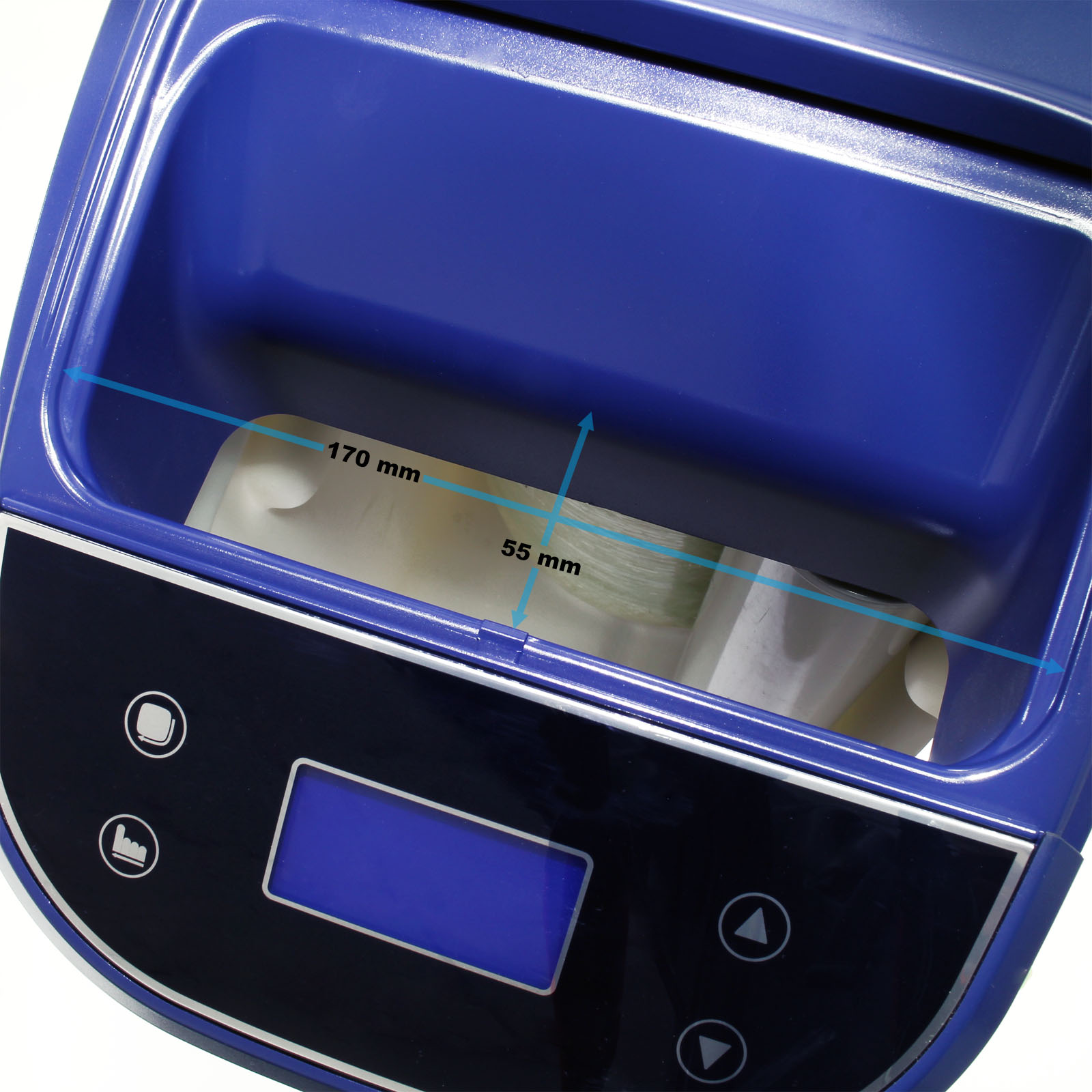

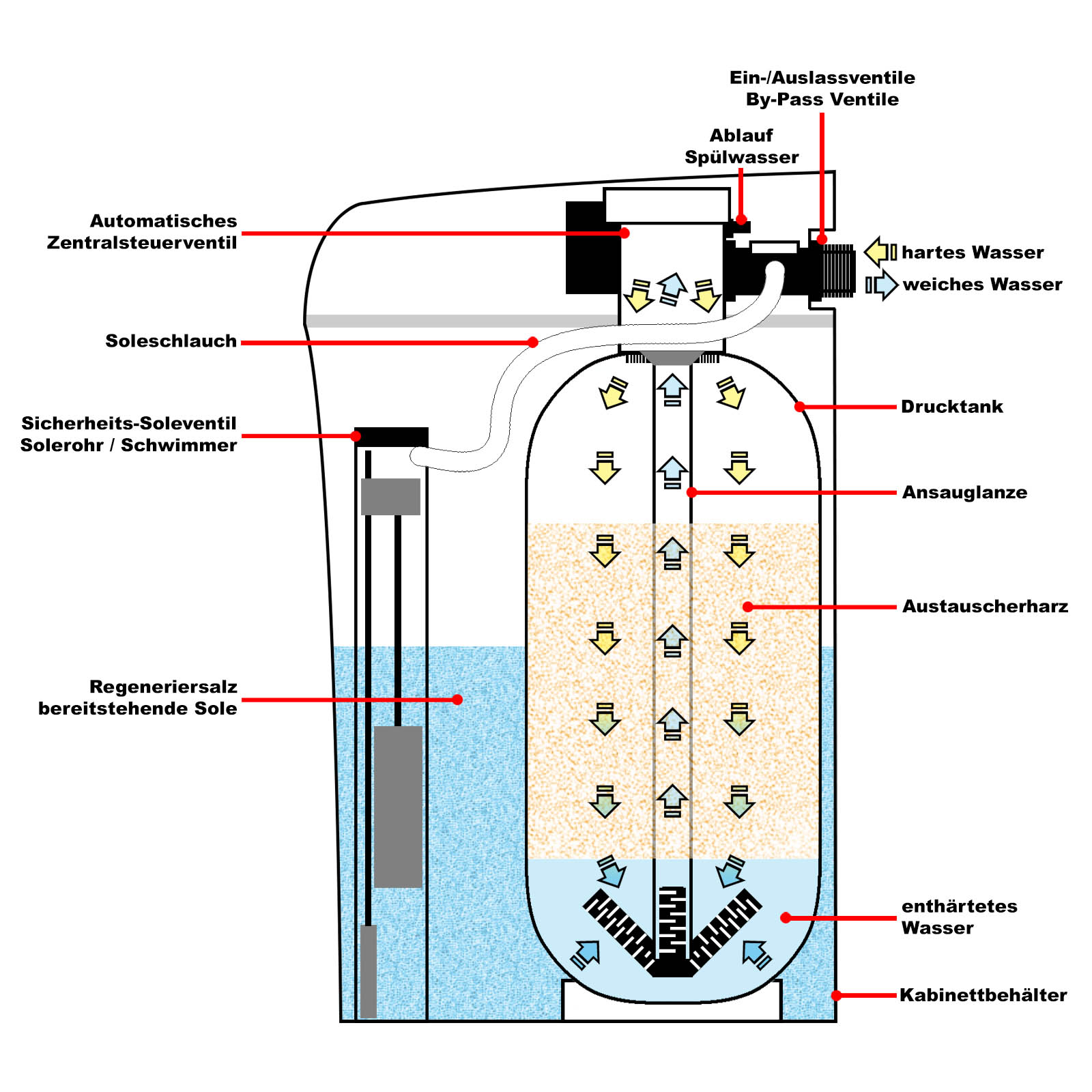
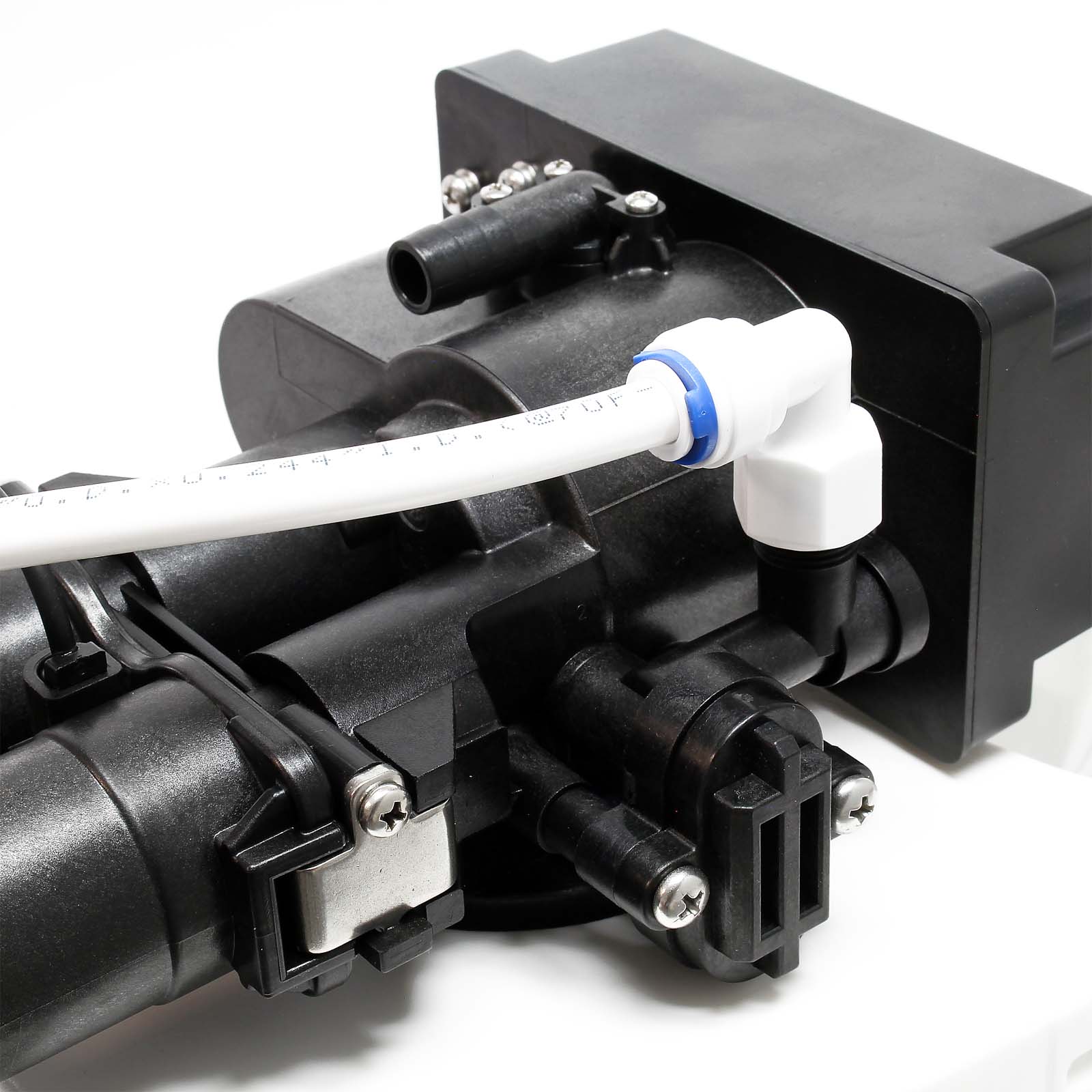




























• With a max. flow rate of 2000 l/h
• Brine fountain for 10 kg softening salts
• Ion exchanger removes lime from tap water
• Softener provides soft water
• The pre-existing hardness of the water can be selected via the display
Hard water is defined by a very high concentration of calcium carbonate. It occurs when the water flows through calcareous rock layers and soils and absorbs ions of the alkaline earth metals. For the determination of the equivalent concentration the hardness forming ions calcium and magnesium are used. Since the composition of the soil and rock layers can vary greatly and some households are also supplied with surface water from reservoirs, the water hardness can vary greatly from one household to another.
In the case of water hardness, a basic distinction is made between three degrees of hardness:
Soft water containing less than 1.5 milimoles of calcium carbonate per litre (mmol/l), which corresponds to 8.4°dH (°dH = degree of German hardness). In the range from 1.5 to 2.5 milimoles of calcium carbonate one speaks of water with a medium degree of hardness and from more than 2.5 milimoles of calcium carbonate per litre the water possesses more than 14°dH and thus is called hard. More detailed information about the hardness of your water can be obtained from your water supplier.
If you use hard tap water as drinking water, the taste differs significantly from that of soft water. Most people find that soft water has a more pleasant taste, even if drinking hard water is by no means harmful to the health. Hard water can also be noticed when showering. It tends to make skin and hair rough and brittle and can therefore be problematic for people with dry skin.
Not only is showering with soft water more gentle on the hair and more pleasant for people suffering from dry skin, but hot drinks allow aromas to unfold better and household appliances such as dishwashers or washing machines enjoy a much longer service life as limescale deposits are reduced to a minimum.
The NW-SOFT-R2 is used to turn your hard tap water into soft tap water.
The NW-SOFT-R2 is capable of softening 2000 litres of water per hour. Operating the device is very easy. The pre-existing hardness of the water needs to be selected via the display and the automatic control unit will alter the hardness of the water accordingly.
The water is softened via ion exchange, which is achieved by a special resin inside the softener by mass exchange. This resin is structured in a way that binds calcium and magnesium ions, i.e. the cations, from the drinking water and at the same time displaces sodium ions into the flowing water. This reduces the hardness of the water, but does not affect the original pH value.
Another great advantage of this system is the automatic regeneration of the exchange resin; the device can exchange the cations bound to the resin due to the salt or brine supply of max. 10 kg. The "lime" better known as calcium and magnesium ions are flushed out of the system as waste water and the regeneration process is complete. Due to this process the resin receives its natural capacity and can be used again.
The only thing that must be filled into the system to ensure the functionality of the resin and make it maintenance free is "normal salt". We recommend regeneration pills since they are easy to use.
| Abmessungen: | 220 x 510 x 1010 mm |
|---|---|
| Ausgangsspannung: | 12 V DC 1,5 A |
| Betriebsdruck: | 1.5 Bar |
| Druck: | Betriebsdruck 1,5–5 bar |
| Eingangsleistung: | 12 Watt |
| Farbe: | weiß |
| Filter stage 1: | Naturewater ion exchanger filter |
| Flow rate ( l/h ): | 2000 LITER |
| Harztank: | 16 l |
| Kabellänge (m): | 1.3 Meter |
| Lieferumfang: | 3m Naturewater PVC-Schlauch Ø 10 mm (innen), Montagekit |
| Material: | Polypropylen (PP) |
| Max. temperature: | 39 °C |
| Min. temperature: | 1 °C |
| Netzspannung/Frequenz (V~Hz): | 220–240 V / 50 Hz |
| Number of filter stages: | 1-stage |
| Produktart: | Wasserenthärter |
| Salztank: | 10 kg |
| Schlauchanschluss: | AG 26,16 mm (3/4 Zoll), Jaco |
| Schlauchlänge: | 3 Meter |
| Tank volume (l): | 16 Liter |
| max. Druck (bar): | 5 Bar |
| präzise Produktart: | Ionenaustauscher |
Empfehlung: Naturewater Anlagen Wasserenthärter
Natychmiast dostępny
• Resin regeneration by timer or by flow volume
• Optimal operating pressure 0.15–0.3 MPa
• Resin tank volume 25 Litres
• Flow rate max. 2000 L/h
Natychmiast dostępny
• Resin regeneration by timer or by flow volume
• Optimal operating pressure 0,15 – 0,5 mpa
• Resin Tank Volume 25 Litres
• Flow rate max. 3000L/h
Natychmiast dostępny
• Brine fountain for 10 kg softening salts
• Ion exchanger removes lime from tap water
• Softener provides soft water
• The pre-existing hardness of the water can be selected via the display
Natychmiast dostępny
• Brine fountain for 12 kg softening salts
• Ion exchanger removes lime from tap water
• Softener provides soft water
• The pre-existing hardness of the water can be selected via the display
Natychmiast dostępny
• Brine fountain for 30 kg softener salts
• Ion exchanger removes lime from tap water
• Softener provides soft water
• The pre-existing hardness of the water can be selected via the display
Natychmiast dostępny
• Brine fountain for 10 kg softener salts
• Ion exchanger removes lime from tap water
• Softener provides soft water
• The pre-existing hardness of the water can be selected via the display
Natychmiast dostępny
• Brine fountain for 10 kg softening salts
• Ion exchanger removes lime from tap water
• Softener provides soft water
• The pre-existing hardness of the water can be selected via the display
Natychmiast dostępny
• Resin tank with 16 l capacity
• Resin regenerated by brine
• Max. operation pressure 6 bar
• For decalcified/soft water
Natychmiast dostępny
• Resin tank with 12.5 l capacity
• Resin regenerated by brine
• Max. operation pressure 5 bar
• For decalcified/soft water
Natychmiast dostępny
• Resin tank with 25 l capacity
• Resin regenerated by brine
• Max. operation pressure 5 bar
• For decalcified/soft water
Natychmiast dostępny
• Activated carbon filter element
• 6.5 l activated carbon tank
• Max. operation pressure 5 bar
• For filtered water
Natychmiast dostępny
• Activated carbon filter element
• 13 l activated carbon tank
• Max. operation pressure 5 bar
• For filtered water
Empfehlung: Naturewater Boosterpumpe
Natychmiast dostępny
• Supplies, increases, or boosts the water pressure
• Increased volume of high-purity water
• Rubber feet for noise reduction
• With pressure adjusting screw (factory-set)
Natychmiast dostępny
• Supplies, increases, or boosts the water pressure
• Increased volume of high-purity water
• Rubber feet for noise reduction
• With pressure adjusting screw (factory-set)
Natychmiast dostępny
• Increased pure water winning
• Rubber feet for reduction of vibrations and noise
• With pressure adjusting screw (factory-set)
Natychmiast dostępny
• Supplies, increases, or boosts the water pressure
• Increased volume of high-purity water
• Rubber feet for noise reduction
• With pressure adjusting screw (factory-set)
Natychmiast dostępny
• Supplies, increases, or boosts the water pressure
• Increased volume of high-purity water
• Rubber feet for noise reduction
• With pressure adjusting screw (factory-set)
Natychmiast dostępny
• Supplies, increases, or boosts the water pressure
• Increased volume of high-purity water
• Rubber feet for noise reduction
• With pressure adjusting screw (factory-set)
Natychmiast dostępny
• Supplies, increases, or boosts the water pressure
• Increased volume of high-purity water
• Rubber feet for noise reduction
• With pressure adjusting screw (factory-set)
Empfehlung: Naturewater Anlagen Osmose
Natychmiast dostępny
• 50 GPD (190 litres/ day)
• Easy assembly
• Easy to use
• Modern & non-pulling
Natychmiast dostępny
• 180l / day
• incl. Tank of polypropylene
• easy in assembly and handling
• without chemicals
• in practical stand with integrated pressure gauge
Natychmiast dostępny
• 180 l/ day
• With booster pump
• Incl. tank of polypropylene
• Manual flushing
• Easy in assembly and handling
• Without chemicals
• Housing in an attractive design
Natychmiast dostępny
• 180l / day
• with booster pump
• incl. Tank of polypropylene
• manual flushing
• easy in assembly and handling
• without chemicals
Natychmiast dostępny
• casing with manometer
• 180l / day
• incl. Tank of polypropylene
• easy in assembly and handling
• without chemicals
Natychmiast dostępny
• 180 l / day
• with booster pump
• incl. Tank of polypropylene
• easy in assembly and handling
• without chemicals
• casing with integrated pressure gauge
Natychmiast dostępny
• 180l / day
• booster pump with integrated pressure gauge
• incl. Tank of polypropylene
• manual flushing
• easy in assembly and handling
• without chemicals
Natychmiast dostępny
• 180l / day
• additional UV lamp for sterilization
• with booster pump
• incl. Tank Popypropylen
• manual flushing
• easy in assembly and handling
• without chemicals
Natychmiast dostępny
• 3-stage filter system with activated carbon filter
• 6 temperature settings between 15 °C and 100 °C
• With H2 module for hydrogen water
• Use at home, at the office or on holiday
Nie jest już dostępny
• 3-stopniowy system filtracji, w tym filtr węglowy aktywny
• 6 poziomów temperatury, wraz z zabezpieczeniem przed dziecmi
• Wskaźnik wymiany filtra i wskaźnik poziomu wody
• Do użytku w domu, biurze, na kempingu itp.
Natychmiast dostępny
• 1728 litrów przefiltrowanej wody dziennie
• System filtrów pięciostopniowy z filtrem T33
• Zimna, gorąca i gazowana woda
• Elegancki design
Natychmiast dostępny
• Wskaźnik wymiany filtra LED
• Zbiornik zapasowy o pojemności 5,5 litra
• Wkład T33
• 380 litrów na dobę
Natychmiast dostępny
• Wskaźnik wymiany filtra LED
• Zbiornik zapasowy o pojemności 5,5 litra
• Wkład T33
• 190 litrów na dobę
Natychmiast dostępny
• Wskaźnik wymiany filtra LED
• Zbiornik zapasowy o pojemności 5,5 litra
• Wkład T33
• 285 litrów na dobę
Natychmiast dostępny
• Przypomnienie o konieczności wymiany przez diodę LED
• Innowacyjny system bagnetowy do szybkiej wymiany filtra
• Napełnieni szklanki w 4,5 sekundy
• Dla czystej i smacznej wody pitnej
Natychmiast dostępny
• Innowacyjny system bagnetowy do szybkiej wymiany filtra
• Bardzo wąski i oszczędny design
• 4-stopniowy system filtracyjny z filtrem T33
• Dla czystej i smacznej wody pitnej
Natychmiast dostępny
• Przypomnienie o konieczności wymiany przez diodę LED
• Innowacyjny system bagnetowy do szybkiej wymiany filtra
• System filtracji 4-stopniowy z filtrem T33
• Dla czystej i smacznej wody pitnej
Natychmiast dostępny
• Innowacyjny system bagnetowy do szybkiej wymiany filtra
• 190 litrów przefiltrowanej wody dziennie
• 4-stopniowy system filtracyjny z filtrem T33
• Dla czystej i smacznej wody pitnej
Natychmiast dostępny
• Przypomnienie o konieczności wymiany przez diodę LED
• Innowacyjny system bagnetowy do szybkiej wymiany filtra
• System filtracji 4-stopniowy z dwoma wkładami
• Dla czystej i smacznej wody pitnej
Natychmiast dostępny
• Innowacyjny system bagnetowy do szybkiej wymiany filtra
• 285 litrów przefiltrowanej wody dziennie
• 4-stopniowy system filtracyjny z filtrem T33
• Dla czystej i smacznej wody pitnej
Natychmiast dostępny
• Innowacyjny system bagnetowy do szybkiej wymiany filtra
• 380 litrów przefiltrowanej wody dziennie
• 5-stopniowy system filtracyjny z filtrem T33
• Dla czystej i smacznej wody pitnej
Natychmiast dostępny
• Wskaźnik wymiany filtra LED
• Praktyczny zbiornik zapasowy
• Wkład T33
• 380 litrów na dobę
Natychmiast dostępny
• Innowacyjny system bagnetowy do szybkiej wymiany filtra
• 470 litrów przefiltrowanej wody dziennie
• 5-stopniowy system filtracyjny z filtrem T33
• Dla czystej i smacznej wody pitnej
Natychmiast dostępny
• 1728 litrów przefiltrowanej wody dziennie
• System filtrów pięciostopniowy z filtrem T33
• Innowacyjny system bagnetowy do szybkiej wymiany filtrów
• Przypomnienie o wymianie filtra za pomocą diody LED


